That makes sense - I figured it was something like that.I think it is. If I'm correct, that flag is the governmentless flag of Prussia, to which every nation reverts if they cease existing
The Most Sublime Porte - An Ottoman AAR
- Thread starter Riotkiller
- Start date
-
We have updated our Community Code of Conduct. Please read through the new rules for the forum that are an integral part of Paradox Interactive’s User Agreement.
You are using an out of date browser. It may not display this or other websites correctly.
You should upgrade or use an alternative browser.
You should upgrade or use an alternative browser.
Threadmarks
View all 63 threadmarks
Reader mode
Reader mode
Recent threadmarks
Chapter Fifty-Four: New Challenges (1928-1929) Chapter Fifty-Five: The Ottoman Golden Age (1930-1934) Chapter Fifty-Six: Scandal and Conflict (1934-1937) Chapter Fifty-Seven: The Caucasian War (Part I) Chapter Fifty-Eight: The Caucasian War (Part II) Chapter Fifty-Nine: The End of an Era (1938-1940) Chapter Sixty: The Bulldog Imperilled (1939-1943) Chapter Sixty-One: Troublesome Greeks (1943-1945)It seems that those reforms will have to be implemented quickly, or else the Ottomans won't have much of an army left to reform if it keeps getting picked away at crisis after crisis.
Aye, it seems like all across Europe antagonism has been rising.Those peaceful years seem so long ago now.
The Porte itself is mildly concerned that an alliance intended to ensure Austrian support against the enemies of the Sultan has seemingly turned into an alliance where the Ottomans consistently rescue the Habsburg's...It seems that those reforms will have to be implemented quickly, or else the Ottomans won't have much of an army left to reform if it keeps getting picked away at crisis after crisis.
Chapter Twelve: The First War of Italian Independence (Part I)
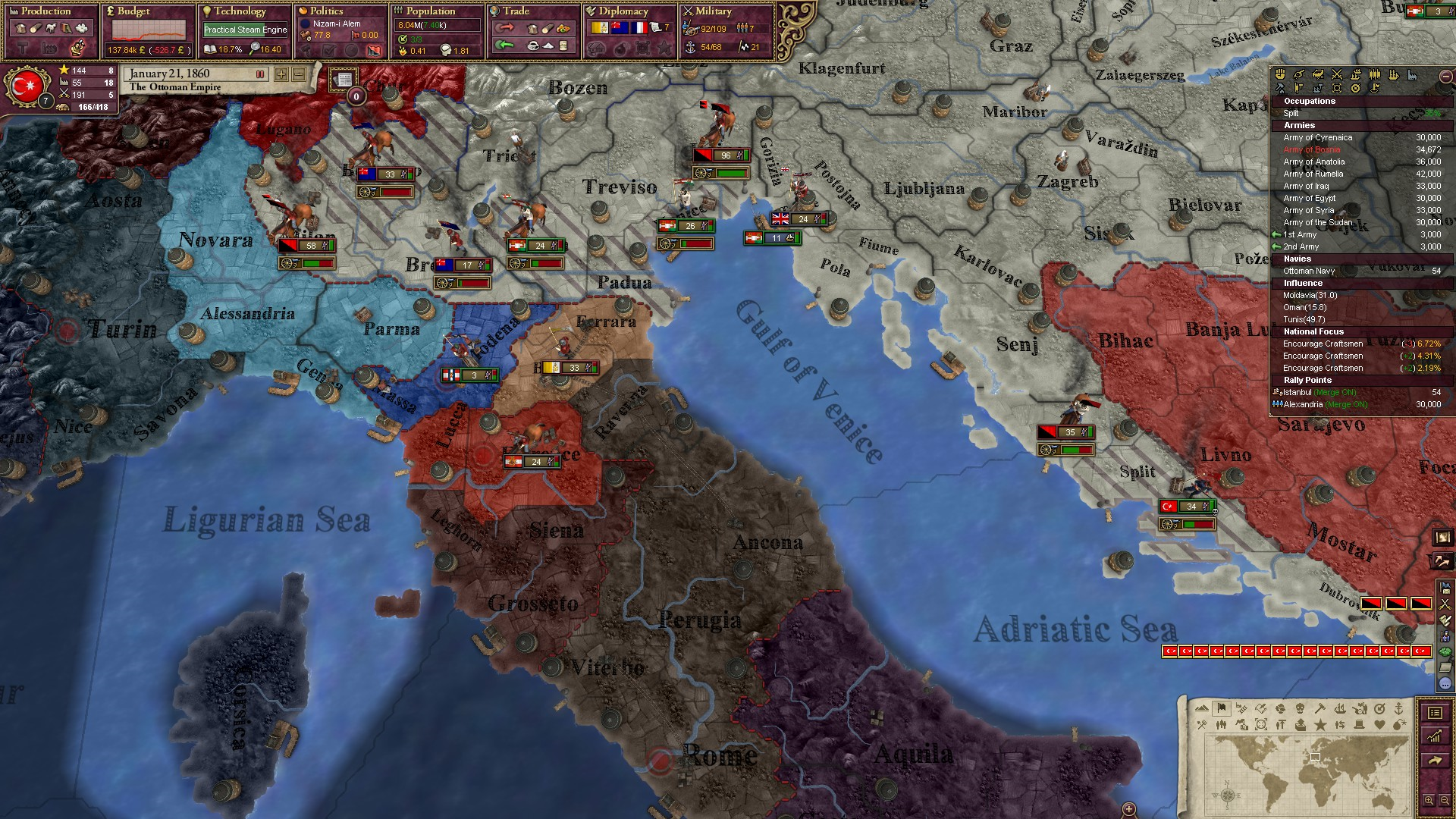
The Italian Front at the start of the Franco-Austrian War of Italian Independence
The Habsburg forces were also severely demoralised after the disasters of the past few years; and Emperor Franz Josef was fully aware of the possibility of further rebellions in the outer regions of the Empire, such as Galicia-Lodomeria and Dalmatia, that could not be dealt with if all of the overstretched Habsburg forces were rushed to the Italian Front. While the Sublime Porte had already committed the Army of Bosnia to helping put down the Croatian Rebellion, Franz Josef therefore requested further support from the Ottoman Empire. As well as reinforcements for the Italian Front once the Croatians had been defeated, the Ottoman vassals of the Principalities of Moldavia and Wallachia were to send their forces north to deal with the Polish rebellion, before they too could march west.
For the Sublime Porte, this led to much uncertainty. Unlike the war with Prussia, plans for war with France had been thoroughly developed during the Levantine Crisis at the start of the previous decade, and with the recent military reforms it was hoped that the Ottoman forces would be in a far better position than they were in Prussia. On the other hand, the war with Prussia took place a long way from Ottoman soil, and whilst the defeats our forces suffered were humiliating, they did not threaten the Empire itself. The French and the Sardinians both had very capable navies that could cause the Empire far more problems, whilst the French forces in Algeria were capable of invading Ottoman Tripolitania and Egypt, even if our vassals in the Beylik of Tunis remained neutral.
As a result, whilst the Army of Bosnia was sent to the Italian Front after the defeat of the Croatians, the Porte was unwilling to commit further forces far abroad in 1860. The Army of Cyrenaica and the Army of Egypt were both placed on standby in North Africa, whilst the Army of Rumelia assisted our vassals in defeating the rebellion in Galicia-Lodomeria. As the fighting remained contained to North Italy, with the Habsburg’s putting up a surprisingly strong resistance, the Porte became more confident. Ottoman forces tasted their first action in the war at the October 1860 Battle of Udine, where an allied coalition under the command of General Abdullah Pasha scored a massive victory over the French forces and their rhythmically named commander Paul de Gaulle.
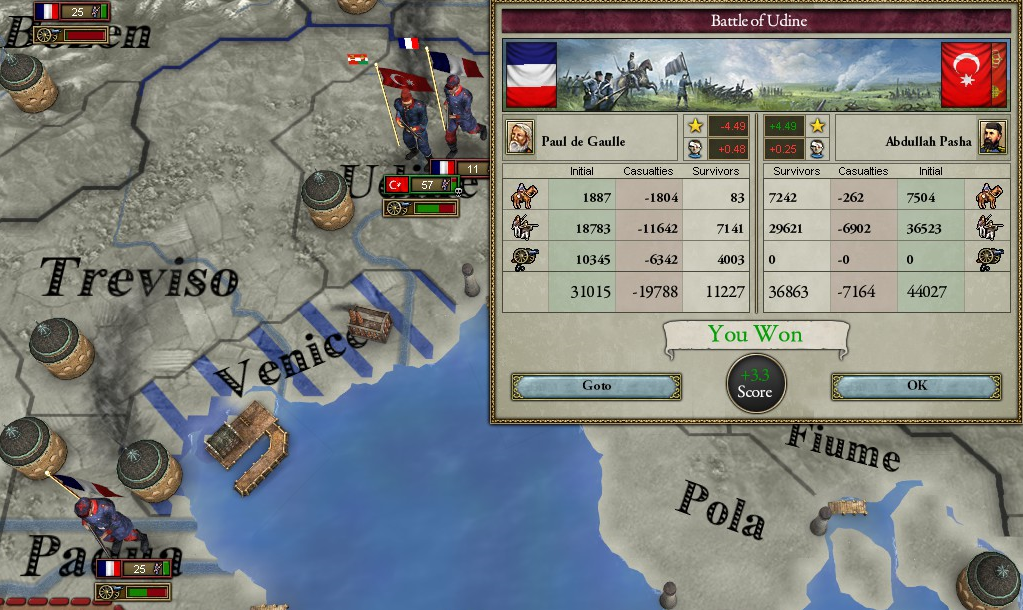
Battle of Udine and the Italian Front (October 21st 1860)
Udine, in the Habsburg state of Venetia, had been the furthest east the French had thus far managed to penetrate, and by defeating their foremost forces, Abdullah Pasha was able to pursue Paul de Gaulle to the French headquarters in Venice itself. On November 8th 1860, the entire remaining forces under Paul de Gaulle were trapped and defeated on the outskirts of Venice, culminating in a humiliating surrender for the French. Abdullah began to besiege the city of Venice, whilst the delighted Porte authorised the Army of Rumelia to begin marching west and provide support in the coming battles.
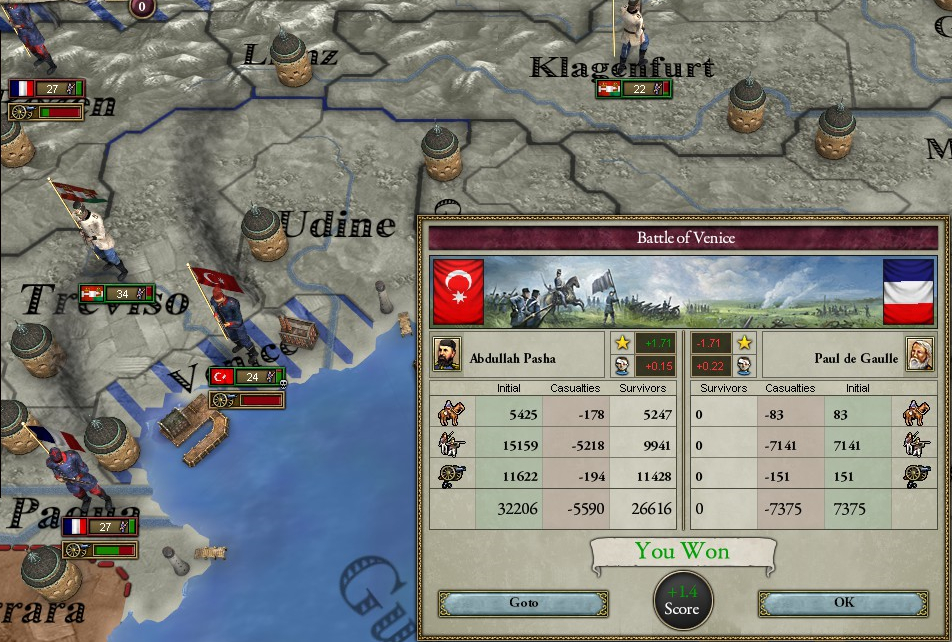
Battle of Venice (November 8th 1860)
In autumn 1860, the French in North Africa had also violated the neutrality of Tunis and seized the Ottoman city of Tripoli. Two French colonial armies were advancing east along the North African coastline toward the headquarters of the Army of Cyrenaica in Benghazi. The Army of Cyrenaica was predominantly made of inferior colonial troops, and had yet to receive any engineer brigades. The Porte therefore forbade its commander Selim Bey from launching an immediate counter-attack on the French forces. The Army of Egypt, under experienced commander Ziya Bey, instead took up position ahead of Selim Bey’s forces, at the town of Sirt. Whilst the Army of Egypt was also lacking engineers, its forces were the most experienced in the entire Ottoman Army, and Ziya Bey had shown his capability in numerous campaigns.
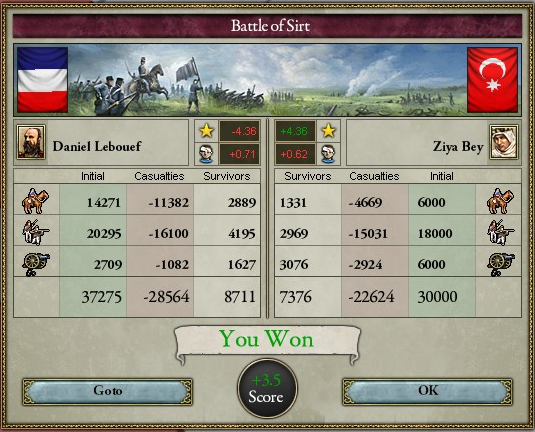
Battle of Sirt (December 12th 1860)
The French forces, anticipating that their attack would be on our underequipped Army of Cyrenaica, would soon receive a nasty surprise. Their commander Daniel Lebouef, leading the cream of the French forces in North Africa, began his attack on December 12th 1860. Instead of the easy victory he had expected, a truly monumental battle broke out – and despite taking some extremely heavy casualties, the Army of Egypt was able to repulse the French attackers. Ziya Bey’s forces were in no state to pursue the French alone, but Selim Bey’s Army of Cyrenaica now came to the fore. By grouping together, the two armies were able to assault the recuperating French at the Battle of Misratah in January 1861, and all but destroy the remnants of Lebouef’s forces.
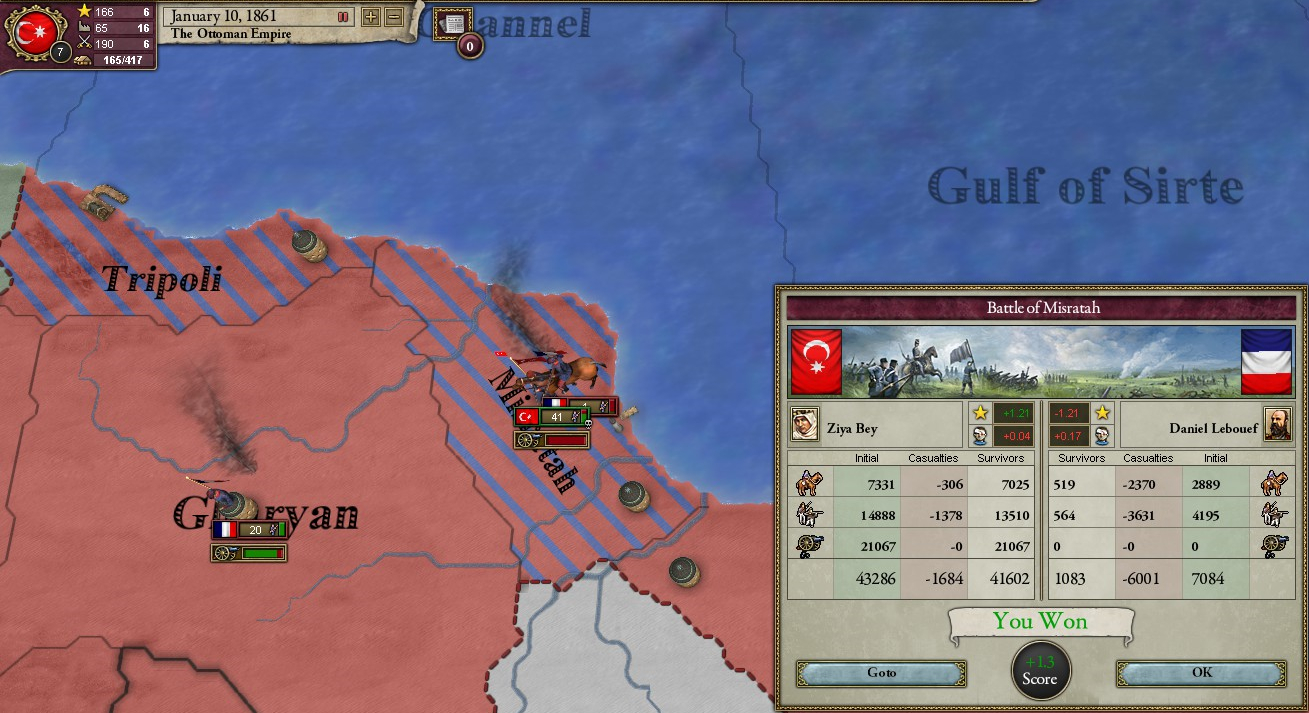
The Battle of Misratah and the North African Front (January 10th 1861)
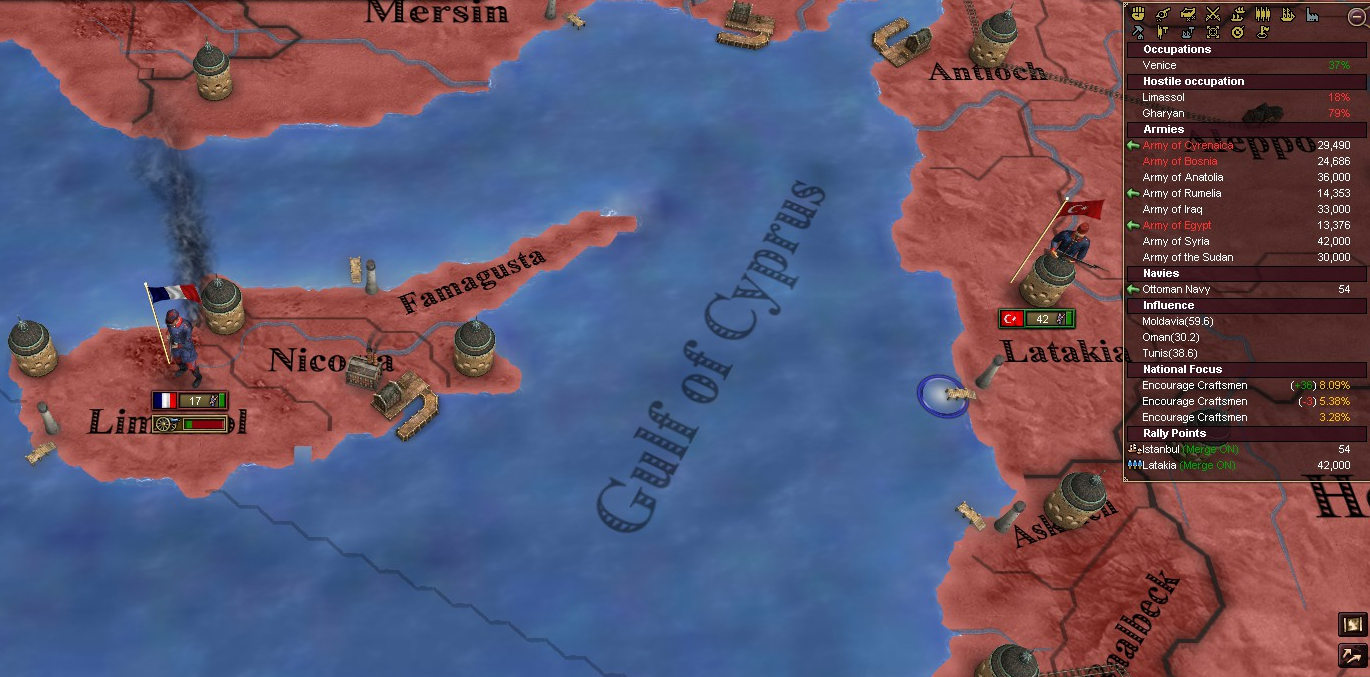
French forces land in Cyprus (December 1860)
These successes were the first major Ottoman victories in a straight fight against a true Great Power of the world for generations, and the Porte was delighted. The fact that Udine had been proved not to be a one-off, but our forces were capable of matching the French in both Europe and in North Africa had exceeded all expectations for Ottoman forces, and despite the news that a French army had landed on Cyprus at the end of December 1860, the Sultan and the Grand Vizier were exuberant. Abdulaziz sent the repaired Ottoman Navy to Latakia in Syria, where the Army of Syria under commander Rifat Pasha began preparations to retake Cyprus.
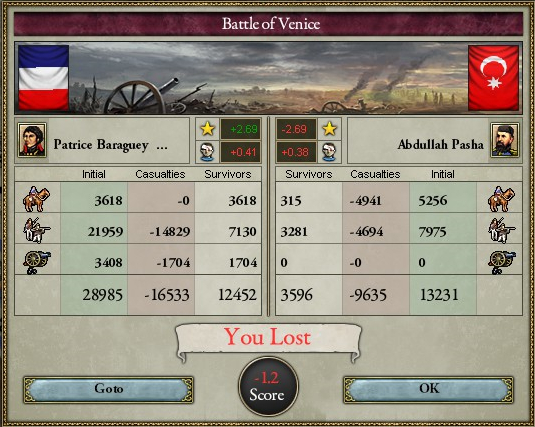
Second Battle of Venice (February 5th 1861)
Unfortunately, the good run came to an end in Second Battle of Venice in February 1861. Abdullah Pasha was by now running very low on supplies, with the city still holding out, and the constant fighting had cut his army down to nearly 33% of its full strength. While he once more inflicted huge casualties on the French attackers, he was eventually forced to pull back or risk utter annihilation. Elsewhere though, our Habsburg allies had once again collapsed, and Abdullah Pasha could not find a safe path of retreat. Whilst he attempted to cross the Alps, a Sardinian Army ambushed and defeated the remnants of his forces in April 1861, and the entire Army of Bosnia was consequently wiped out.
The loss of an entire Army was something unprecedented in modern times for the Porte, and the Porte was all too aware of how open the Balkans now were, with the Army of Rumelia having taken heavy casualties against the Poles and still recovering in Hungary. A secondary French invasion force north of the Alps had shocked the unprepared Austro-Hungarians, and in April 1861 the great city of Vienna itself had fallen to the French. The Habsburg court had fled to Budapest, but the Porte was forced hurriedly send the Army of Anatolia west into the Balkans to make sure that the French could advance no further - it was clear that despite our successes, we would very much have to remain on the defensive in this war from now on.
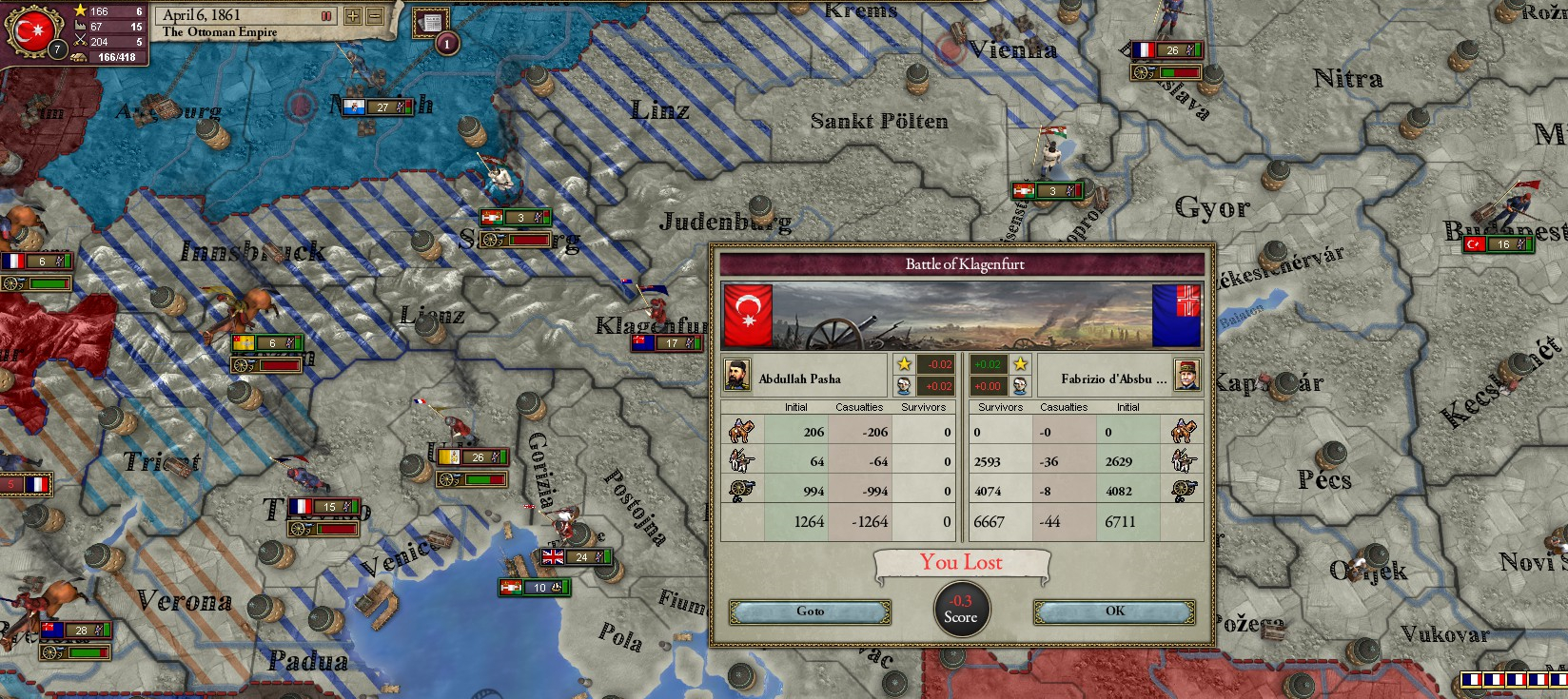
Battle of Klagenfurt and the French occupation of Vienna (April 1861)
At the same time as Abdullah Pasha’s surrender, however, Rifat Pasha had landed on Cyprus and, after a minor skirmish in Nicosia, had crushed the bulk of the French invasion forces at the Battle of Limassol. With the remaining French forces on the island surrendering soon after, the Porte had mixed feelings going into summer 1861. Our forces were clearly capable of inflicting defeats on our enemies, but we were also severely outnumbered. Much more caution would be required henceforth.
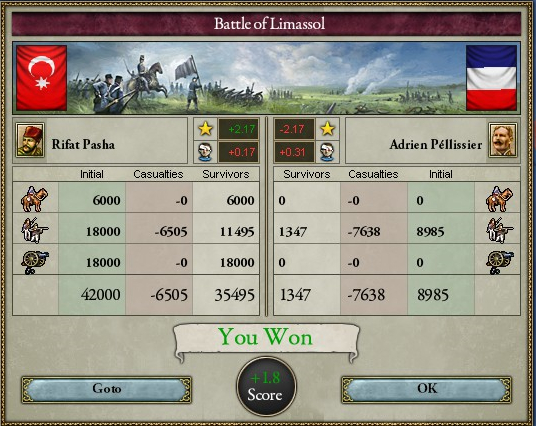
Battle of Limassol (March 26th 1861)
- 1
The fighting is actually going pretty well. Even in the defeat of Second Venice the soldiers of the Porte did not dishonour themselves.
The recent reforms certainly seem to have led to a far better performance, it is trueThe fighting is actually going pretty well. Even in the defeat of Second Venice the soldiers of the Porte did not dishonour themselves.
A very seesaw-like series of events there, with a strong first showing counterbalanced by a running battle in Italy and the Balkans simply to stanch the flow of the French and their Italian allies.
While I doubt the AI is really that sophisticated, I can't help but feel that the French incursions in the Mediterranean and North Africa would fit perfectly as feints and calculated sacrifices in the greater strategic scope, meant to pin Ottoman troops down at home while the French bring their full force to bear in against the Austro-Hungarians.
While I doubt the AI is really that sophisticated, I can't help but feel that the French incursions in the Mediterranean and North Africa would fit perfectly as feints and calculated sacrifices in the greater strategic scope, meant to pin Ottoman troops down at home while the French bring their full force to bear in against the Austro-Hungarians.
Wow, good work against the French even with the loss of an Army! Are your leaders particularly good at this point? Also, any action at sea?
Well, the invasion of Cyprus was certainly a good distraction, but whether that's due to strategic planning or simply just shows their significant numerical superiority, I'm not too sure!A very seesaw-like series of events there, with a strong first showing counterbalanced by a running battle in Italy and the Balkans simply to stanch the flow of the French and their Italian allies.
While I doubt the AI is really that sophisticated, I can't help but feel that the French incursions in the Mediterranean and North Africa would fit perfectly as feints and calculated sacrifices in the greater strategic scope, meant to pin Ottoman troops down at home while the French bring their full force to bear in against the Austro-Hungarians.
The victory at Sirt was critical though, as the economically productive regions of Egypt are no longer under immediate threat of occupation. The Porte would far rather fight the French in Tripolitania & the Fezzan than in Egypt itself, especially since that could've sparked another Egyptian rebellion.
I used my national foci to significant increase the number of officers in the Empire, which has increased my leadership and given some useful organisation bonuses. The leaders themselves are mostly average - though far better than having no leader at all. I'm finally at the point where I can (just about) have a general in charge of each of my armies at all times.Wow, good work against the French even with the loss of an Army! Are your leaders particularly good at this point? Also, any action at sea?
Aside from the battles on Cyprus, there have not been any battles at sea yet. That may change soon though...
That's not really needed. The French and Sardinian navies already prove a real threat of invasion of those territories. It would force Ottoman forces to remain there even if they wouldn't invadeA very seesaw-like series of events there, with a strong first showing counterbalanced by a running battle in Italy and the Balkans simply to stanch the flow of the French and their Italian allies.
While I doubt the AI is really that sophisticated, I can't help but feel that the French incursions in the Mediterranean and North Africa would fit perfectly as feints and calculated sacrifices in the greater strategic scope, meant to pin Ottoman troops down at home while the French bring their full force to bear in against the Austro-Hungarians.
That's not really needed. The French and Sardinian navies already prove a real threat of invasion of those territories. It would force Ottoman forces to remain there even if they wouldn't invade
That's a fair point.
Perhaps less a feint as such, then, and more in keeping with Sun Tzu's legendary shuai-jan snake: Try to reach for its head, and you'll be attacked by its tail, or vice-versa.
Chapter Thirteen: The First War of Italian Independence (Part II)
The summer campaigns of 1861 did not start well for the Porte. The defeat of one of the two French North African armies at Misratah in January, followed by the victory in Cyprus, had raised hopes that French forces could be evicted from Ottoman territory entirely in Africa. With the Army of Egypt still recuperating from the heavy losses sustained at Sirt, Selim Bey’s Army of Cyrenaica was therefore authorised to attack the remaining French forces at Sabha in the Fezzan.
The colonial Army of Cyrenaica was known to be of a lower quality than the Army of Egypt, but with a 2:1 advantage in numerical superiority over the French, it was hoped that sheer weight of numbers could win the day. It was not to be. Whilst not a catastrophe, the French were able to drive back Selim Bey with quite heavy losses in the Battle of Sabha, and the Porte resigned itself to the inevitability of a prolonged period of warfare in Tripolitania as a result.
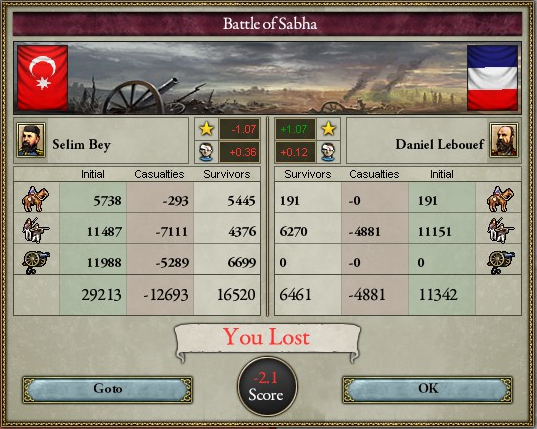
The Battle of Sabha (May 28th 1861)
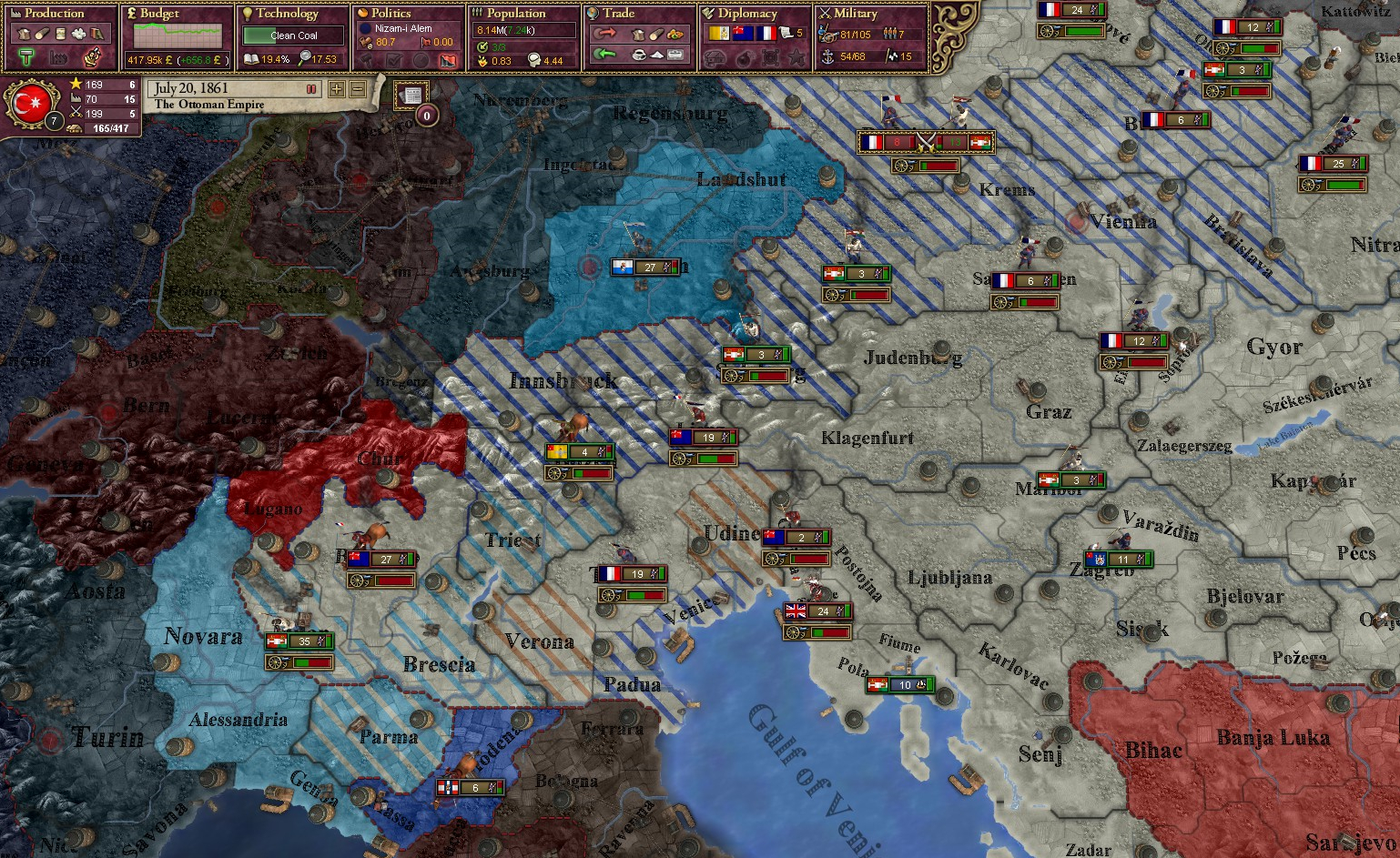
The Frontline in Europe (July 20th 1861) [1]
In Austria-Hungary itself, the situation looked increasingly grim. The Habsburgs still had a large force in Lombardy facing off against the Sardinians, which had been reasonably successful. The French invasion that had come through Germany had caught them utterly off-guard however, and not only was Tyrolia in enemy hands, alongside the capital of Vienna - but the industrial heartlands of Bohemia & Moravia were also under siege, with few Habsburg forces remaining to defend them.
With the Ottoman forces having pulled back to a defensive line on their own borders whilst awaiting the transfer of the Army of Anatolia to the frontline, the Habsburg’s also found themselves fighting alone in summer 1861. Despite all expectations in Paris, Istanbul, and indeed most of Europe however, the Habsburg government in Budapest did not surrender. Whilst the Porte had sat out most of the fighting in summer 1861 anticipating Austria-Hungary signing an armistice, Sultan Abdulmejid intervened in the autumn when it was clear one was not forthcoming. The Sultan, impressed by the resolve of Emperor Franz Josef, decreed that the Porte would not let the Habsburg's fight on alone.
Elsewhere, the Ottoman-supported House of Rashid had finally won the long Arabian Civil War after seven years in August 1861, and with the defeat of the House of Saud in Nejd, the Porte was no longer concerned about one of its major flanks. The winter of 1861 was therefore spent renewing the attack in North Africa at the urging of the Sultan, with the city of Tripoli retaken by Selim Bey’s Army of Cyrenaica, and Ziya Bey finally crushing the battered remnants of the first French North African army in the Second Battle of Misratah in October.
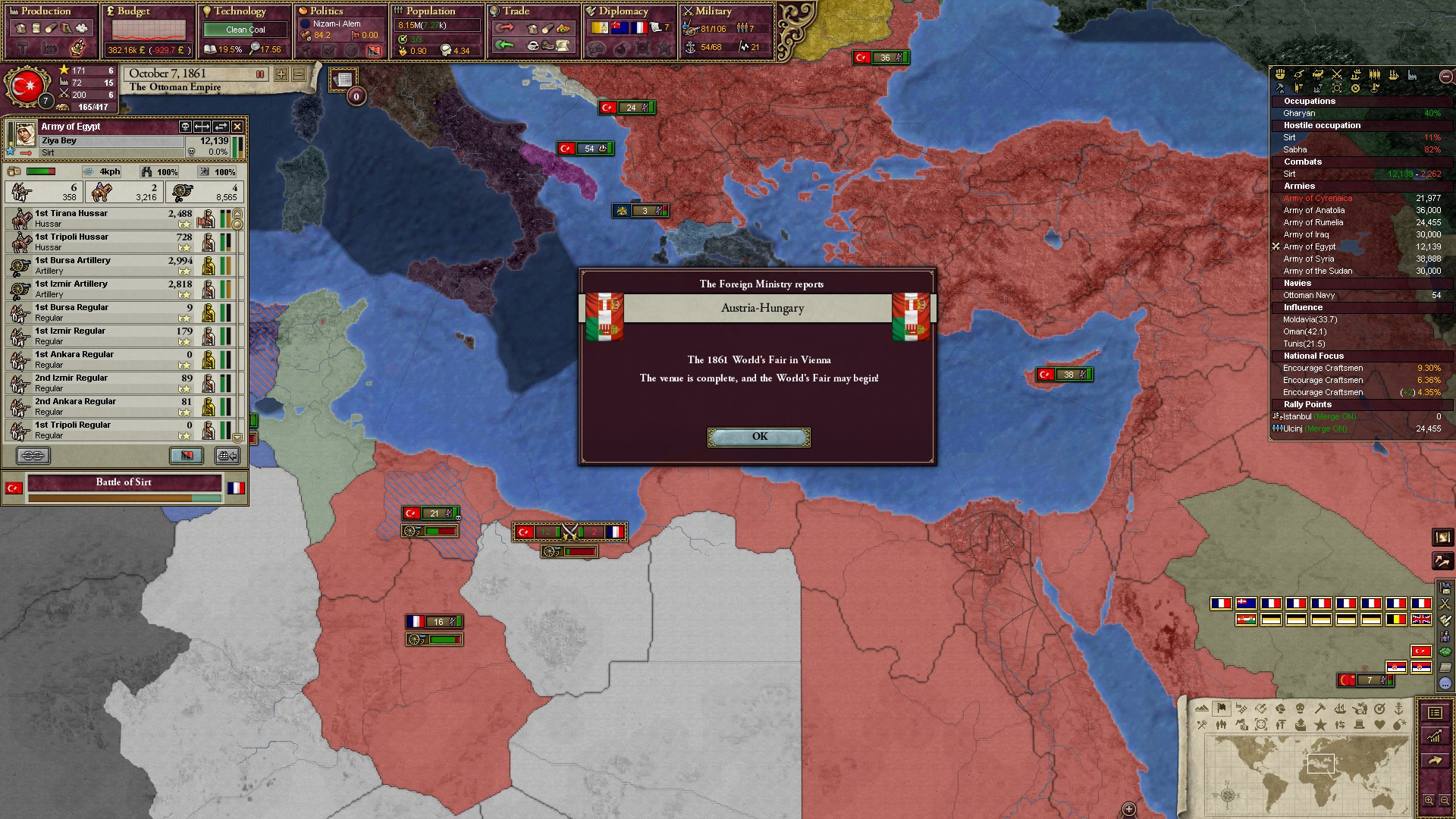
The status of the North African Frontline whilst the World's Fair begins in French-Occupied Vienna (October 7th 1861)
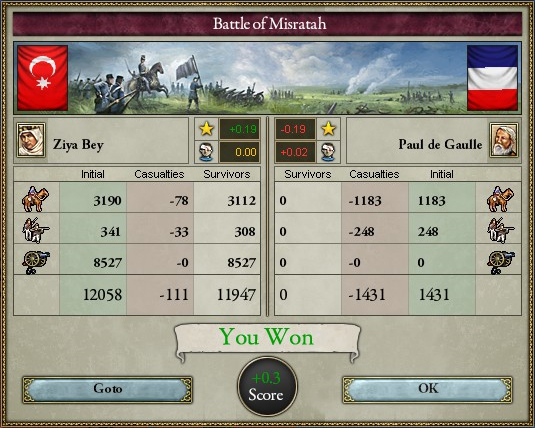
The French surrender at the Second Battle of Misratah (October 30th 1861)
In October 1861, the bizarre situation of the World’s Fair being held in the city of Vienna despite it being occupied by the French also occurred. The French had permitted the locals to continue most of the work on it, but made a mockery of the Habsburg’s by placing Italian and Slavic nationalist delegations at the heart of the Fair, alongside French works. The Sublime Porte boycotted the event entirely as a result - with Grand Vizier Abdulaziz making clear to the world that this was solely due to the French occupation, and not because the Empire could not afford the cost of sending a delegation whilst fighting the costly ongoing war… Although whether or not the neutral European governments believed him is a matter of debate.
With Sultan Abdulmejid’s desire not to lose face by abandoning an ally that was so bravely continuing to fight, however, the Porte had also decided to activate the alliance with our vassals in the Beylik of Tunis in autumn 1861. Whilst the French had violated their neutrality to seize Tripoli, they had not occupied the Beylik, and with their remaining North African forces having been forced into the deserts of the Fezzan, the Bey of Tunis found his forces unopposed as he marched into Algeria.
And so, as 1862 began with the Habsburg’s still refusing to surrender, the Porte began preparing for new offensives against the French. The Army of Rumelia had recovered to almost full strength, but it was the similarly restored Army of Egypt that struck first. In February at the Battle of Ghadamis, the exhausted French troops that remained in Tripolitania were defeated, and whilst the Army of Cyrenaica was sent south to recover the Fezzan, the Army of Egypt began to pursue the French through the desert - with the last remaining French North African forces surrendering at the oasis of Ilizi in March 1862.
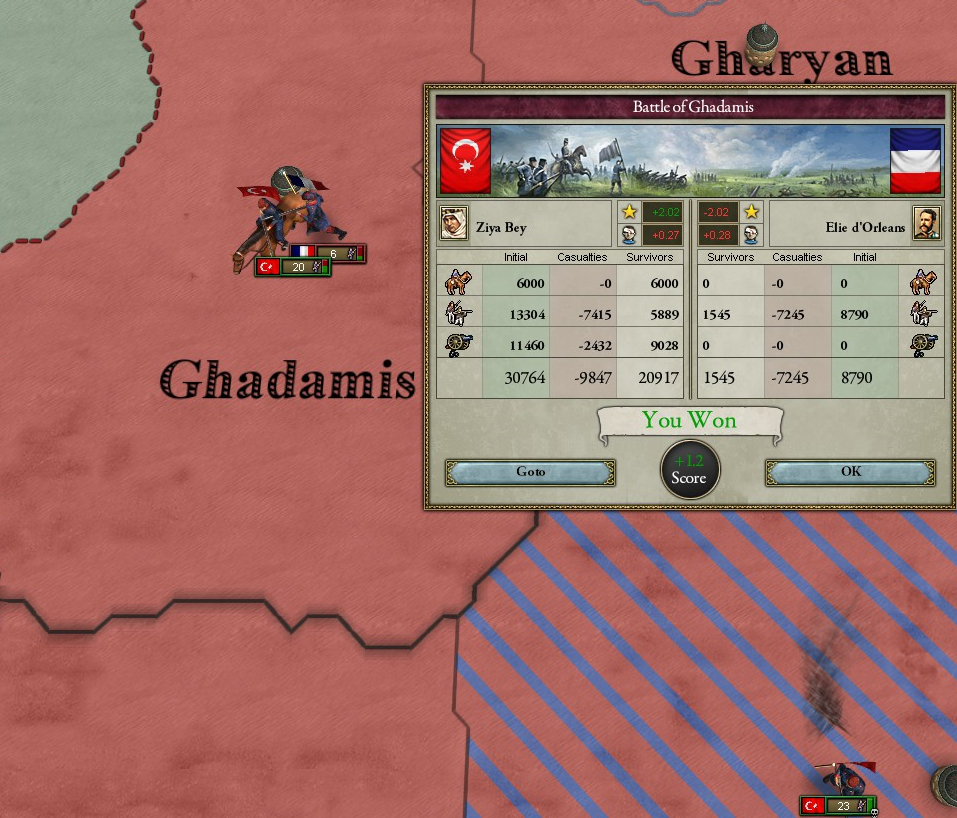
The Battle of Ghadamis and the North African Front (February 26th 1862)
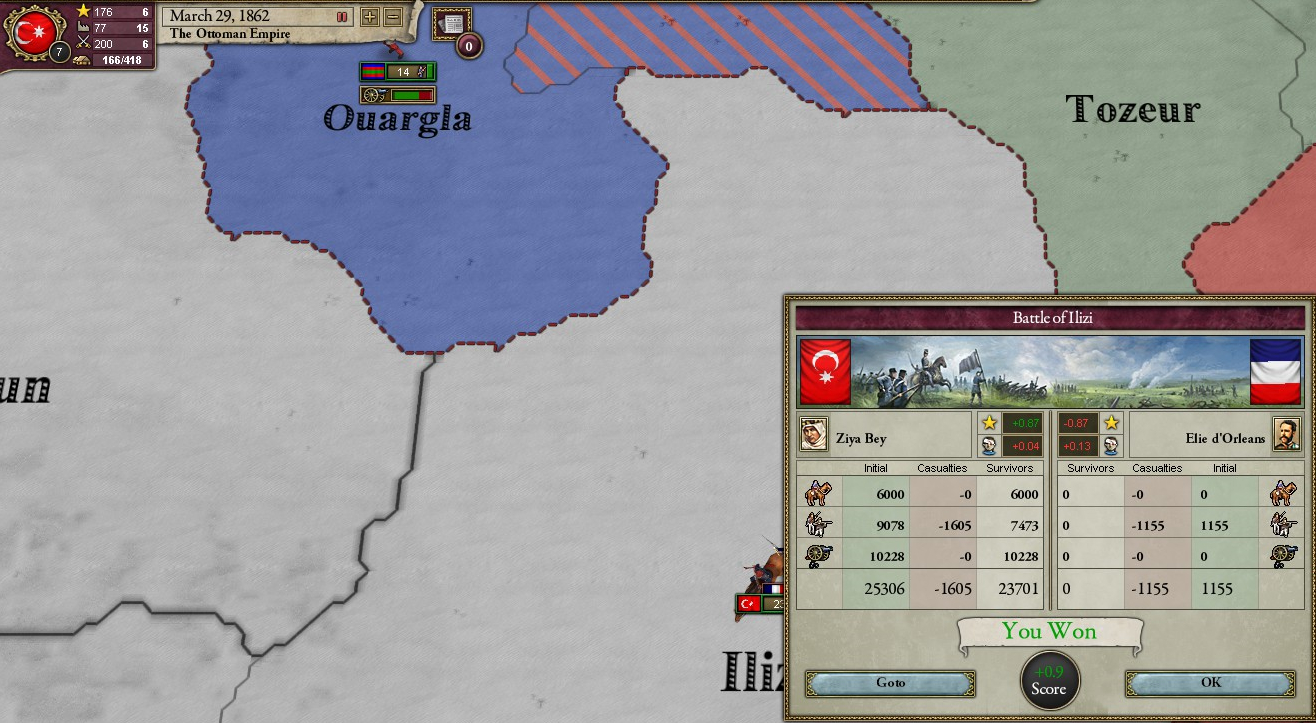
The French Surrender at Ilizi, and the Tunisian occupation of Algeria (March 29th 1862)
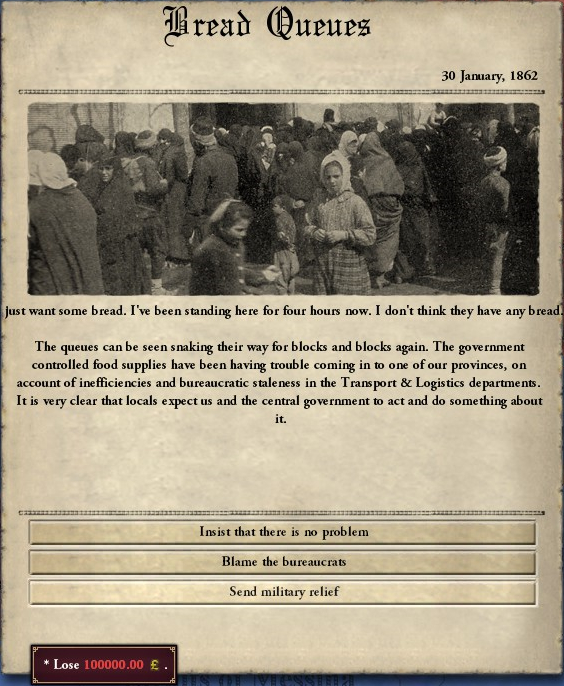
Bread Queues hit the Ottoman Empire in January 1862
The reequipping of Ottoman forces had not come without cost, however. The Ottoman treasury was running a huge deficit to continue to finance the war, and very expensive military relief had been required to avoid huge bread queues turning into mass famine in some of our border provinces. The Sublime Porte knew that public support for the war was wavering, and that a big victory was needed to restore their belief that the war was worth fighting, lest the masses turn against the government.
Grand Vizier Abdulaziz therefore came up with an outrageous proposal: With the Sardinian & Papal navies busy blockading the Habsburg coastline, the Ottoman Navy would slip between the French patrols and land the Army of Syria on the island of Sardinia itself. Despite the alarm in the Porte of what would occur should the fleet be intercepted, Abdulaziz pressed ahead - and to the shock of the French, the Italians, the Habsburgs, and even many in the Porte itself - it succeeded. 40,000 men under the command of Rifat Pasha landed on Sardinia in March 1862 and began besieging the island - a key province of the Kingdom of Sardinia-Piedmont.
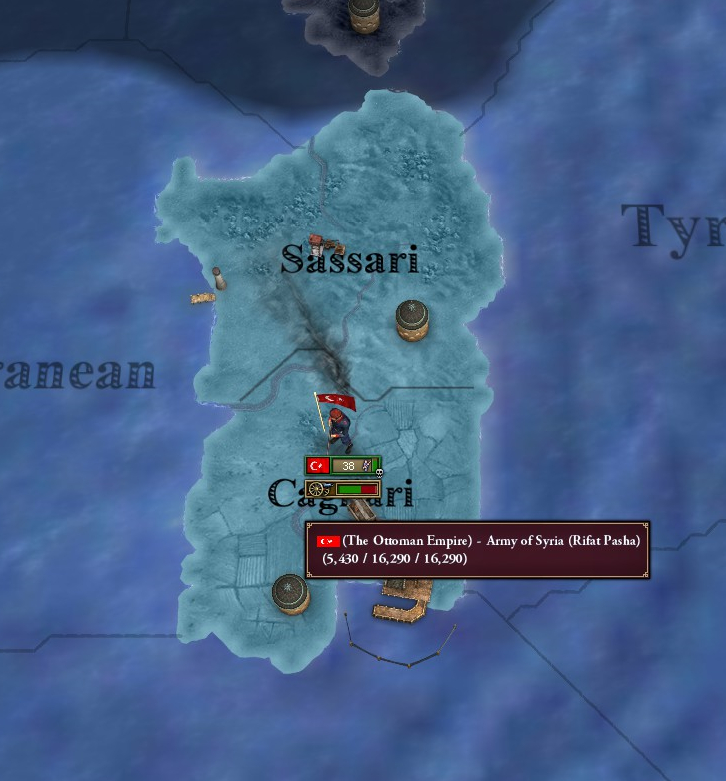
The Ottoman Army of Syria launches the audacious invasion of Sardinia at Cagliari (March 29th 1862)
Soon afterward, the reasons for the Habsburg refusal to surrender became clear at the start of summer 1862. With the French forces having been committed deeper and deeper into Austria-Hungary, the rest of Europe had been watching the situation with interest. The North German Federation, seeing an opportunity to avenge its humiliation over Croatia two years previously, saw this as a golden opportunity. Under the direction of Prussian Chancellor Otto von Bismarck, the German minorities in the French provinces of Alsace and Lorraine began an uprising that led to a brutal French crackdown. Uniting the German people in outrage, Bismarck declared war on France with the aim of liberating Alsace-Lorraine… All while three quarters of the French Army were far away in Austria-Hungary.
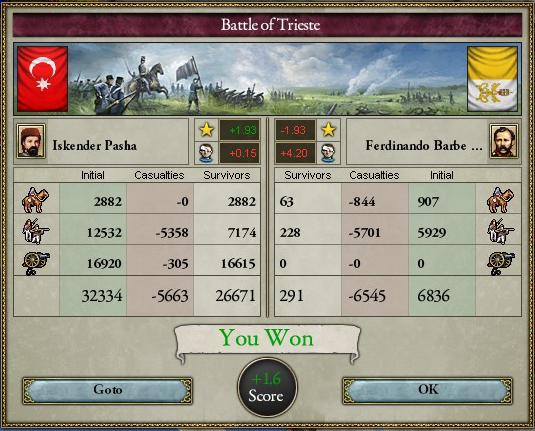
The Battle of Trieste (July 27th 1862)
The Porte had been improving its relations with the North Germans for some time, with the logic of “the enemy of my enemy is my friend” used to justify the reconciliation - and an offensive was launched in the Balkans to coincide with the German invasion. In July 1862, Papal forces that had been besieging the port of Trieste were defeated by Iskender Pasha’s Army of Rumelia, and in the following Battle of Gorizia they were forced to surrender entirely. Simultaneously, Ferid Pasha led the Army of Anatolia in an attack in southern Hungary, inflicting heavy casualties on the French at the Battle of Zalaegerszeg.
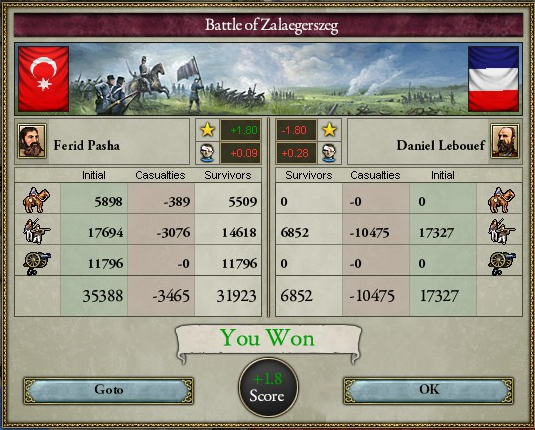
The Battle of Zalaegerszeg (August 10th 1862)
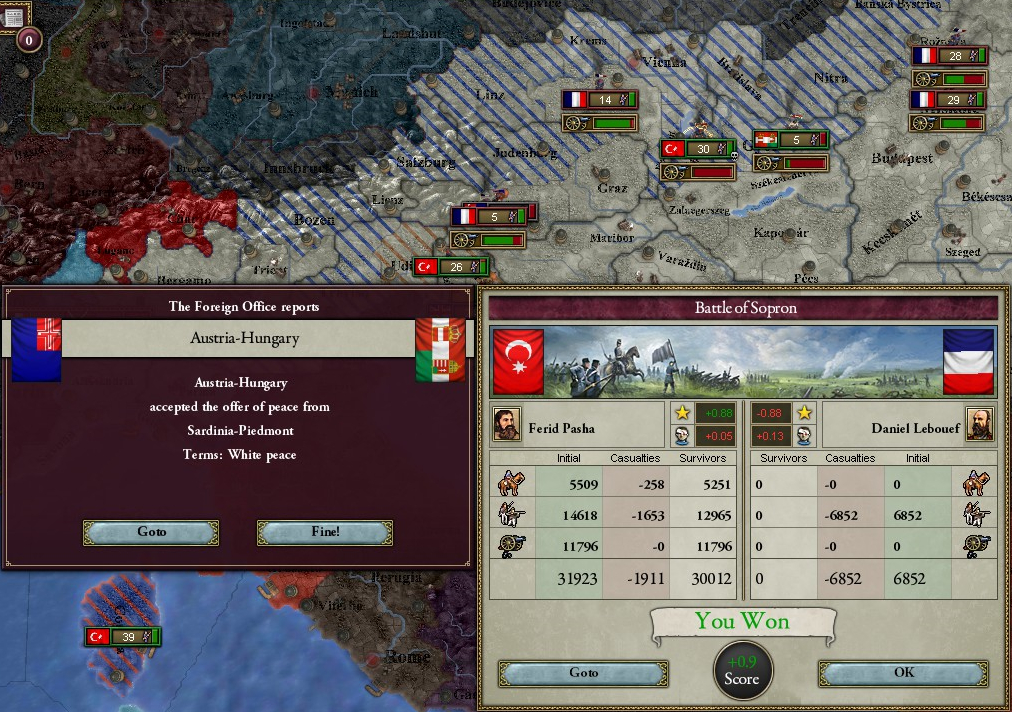
The Battle of Sopron and the Sardinian Surrender (August 28th 1862)
And so, with Rifat Pasha having successfully occupied the entirety of both Sardinia and of Corsica, and Ferid Pasha following Zalaegerszeg by pursuing and annihilating the French at the subsequent Battle of Sopron… The Kingdom of Sardinia-Piedmont decided that enough was enough, and signed a White Peace with the Habsburg government. The war was not over, but despite the huge swathes of land the French were occupying, it was Paris that was on the back foot going in to autumn 1862.
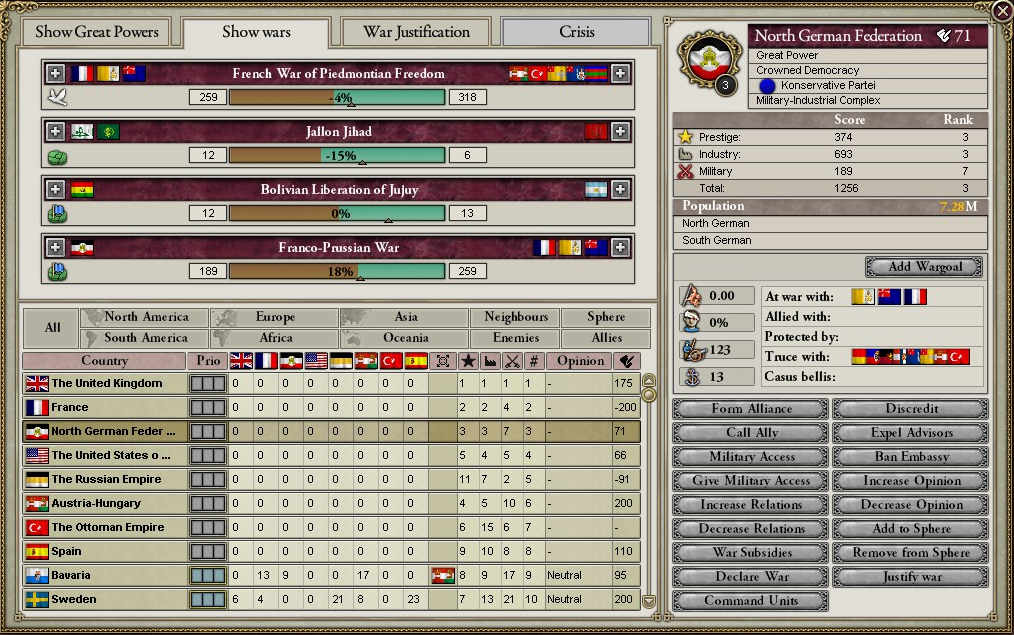
The Ottoman-North German Rapprochement following the start of the Franco-Prussian War (August 1862)
Notes:
[1]: The British are not involved the war, they merely have an army in Trieste due to a military access agreement with Austria-Hungary... Though what it's doing there, the Porte does not know!
The colonial Army of Cyrenaica was known to be of a lower quality than the Army of Egypt, but with a 2:1 advantage in numerical superiority over the French, it was hoped that sheer weight of numbers could win the day. It was not to be. Whilst not a catastrophe, the French were able to drive back Selim Bey with quite heavy losses in the Battle of Sabha, and the Porte resigned itself to the inevitability of a prolonged period of warfare in Tripolitania as a result.

The Battle of Sabha (May 28th 1861)

The Frontline in Europe (July 20th 1861) [1]
In Austria-Hungary itself, the situation looked increasingly grim. The Habsburgs still had a large force in Lombardy facing off against the Sardinians, which had been reasonably successful. The French invasion that had come through Germany had caught them utterly off-guard however, and not only was Tyrolia in enemy hands, alongside the capital of Vienna - but the industrial heartlands of Bohemia & Moravia were also under siege, with few Habsburg forces remaining to defend them.
With the Ottoman forces having pulled back to a defensive line on their own borders whilst awaiting the transfer of the Army of Anatolia to the frontline, the Habsburg’s also found themselves fighting alone in summer 1861. Despite all expectations in Paris, Istanbul, and indeed most of Europe however, the Habsburg government in Budapest did not surrender. Whilst the Porte had sat out most of the fighting in summer 1861 anticipating Austria-Hungary signing an armistice, Sultan Abdulmejid intervened in the autumn when it was clear one was not forthcoming. The Sultan, impressed by the resolve of Emperor Franz Josef, decreed that the Porte would not let the Habsburg's fight on alone.
Elsewhere, the Ottoman-supported House of Rashid had finally won the long Arabian Civil War after seven years in August 1861, and with the defeat of the House of Saud in Nejd, the Porte was no longer concerned about one of its major flanks. The winter of 1861 was therefore spent renewing the attack in North Africa at the urging of the Sultan, with the city of Tripoli retaken by Selim Bey’s Army of Cyrenaica, and Ziya Bey finally crushing the battered remnants of the first French North African army in the Second Battle of Misratah in October.

The status of the North African Frontline whilst the World's Fair begins in French-Occupied Vienna (October 7th 1861)

The French surrender at the Second Battle of Misratah (October 30th 1861)
In October 1861, the bizarre situation of the World’s Fair being held in the city of Vienna despite it being occupied by the French also occurred. The French had permitted the locals to continue most of the work on it, but made a mockery of the Habsburg’s by placing Italian and Slavic nationalist delegations at the heart of the Fair, alongside French works. The Sublime Porte boycotted the event entirely as a result - with Grand Vizier Abdulaziz making clear to the world that this was solely due to the French occupation, and not because the Empire could not afford the cost of sending a delegation whilst fighting the costly ongoing war… Although whether or not the neutral European governments believed him is a matter of debate.
With Sultan Abdulmejid’s desire not to lose face by abandoning an ally that was so bravely continuing to fight, however, the Porte had also decided to activate the alliance with our vassals in the Beylik of Tunis in autumn 1861. Whilst the French had violated their neutrality to seize Tripoli, they had not occupied the Beylik, and with their remaining North African forces having been forced into the deserts of the Fezzan, the Bey of Tunis found his forces unopposed as he marched into Algeria.
And so, as 1862 began with the Habsburg’s still refusing to surrender, the Porte began preparing for new offensives against the French. The Army of Rumelia had recovered to almost full strength, but it was the similarly restored Army of Egypt that struck first. In February at the Battle of Ghadamis, the exhausted French troops that remained in Tripolitania were defeated, and whilst the Army of Cyrenaica was sent south to recover the Fezzan, the Army of Egypt began to pursue the French through the desert - with the last remaining French North African forces surrendering at the oasis of Ilizi in March 1862.

The Battle of Ghadamis and the North African Front (February 26th 1862)

The French Surrender at Ilizi, and the Tunisian occupation of Algeria (March 29th 1862)

Bread Queues hit the Ottoman Empire in January 1862
The reequipping of Ottoman forces had not come without cost, however. The Ottoman treasury was running a huge deficit to continue to finance the war, and very expensive military relief had been required to avoid huge bread queues turning into mass famine in some of our border provinces. The Sublime Porte knew that public support for the war was wavering, and that a big victory was needed to restore their belief that the war was worth fighting, lest the masses turn against the government.
Grand Vizier Abdulaziz therefore came up with an outrageous proposal: With the Sardinian & Papal navies busy blockading the Habsburg coastline, the Ottoman Navy would slip between the French patrols and land the Army of Syria on the island of Sardinia itself. Despite the alarm in the Porte of what would occur should the fleet be intercepted, Abdulaziz pressed ahead - and to the shock of the French, the Italians, the Habsburgs, and even many in the Porte itself - it succeeded. 40,000 men under the command of Rifat Pasha landed on Sardinia in March 1862 and began besieging the island - a key province of the Kingdom of Sardinia-Piedmont.

The Ottoman Army of Syria launches the audacious invasion of Sardinia at Cagliari (March 29th 1862)
Soon afterward, the reasons for the Habsburg refusal to surrender became clear at the start of summer 1862. With the French forces having been committed deeper and deeper into Austria-Hungary, the rest of Europe had been watching the situation with interest. The North German Federation, seeing an opportunity to avenge its humiliation over Croatia two years previously, saw this as a golden opportunity. Under the direction of Prussian Chancellor Otto von Bismarck, the German minorities in the French provinces of Alsace and Lorraine began an uprising that led to a brutal French crackdown. Uniting the German people in outrage, Bismarck declared war on France with the aim of liberating Alsace-Lorraine… All while three quarters of the French Army were far away in Austria-Hungary.

The Battle of Trieste (July 27th 1862)
The Porte had been improving its relations with the North Germans for some time, with the logic of “the enemy of my enemy is my friend” used to justify the reconciliation - and an offensive was launched in the Balkans to coincide with the German invasion. In July 1862, Papal forces that had been besieging the port of Trieste were defeated by Iskender Pasha’s Army of Rumelia, and in the following Battle of Gorizia they were forced to surrender entirely. Simultaneously, Ferid Pasha led the Army of Anatolia in an attack in southern Hungary, inflicting heavy casualties on the French at the Battle of Zalaegerszeg.

The Battle of Zalaegerszeg (August 10th 1862)

The Battle of Sopron and the Sardinian Surrender (August 28th 1862)
And so, with Rifat Pasha having successfully occupied the entirety of both Sardinia and of Corsica, and Ferid Pasha following Zalaegerszeg by pursuing and annihilating the French at the subsequent Battle of Sopron… The Kingdom of Sardinia-Piedmont decided that enough was enough, and signed a White Peace with the Habsburg government. The war was not over, but despite the huge swathes of land the French were occupying, it was Paris that was on the back foot going in to autumn 1862.

The Ottoman-North German Rapprochement following the start of the Franco-Prussian War (August 1862)
Notes:
[1]: The British are not involved the war, they merely have an army in Trieste due to a military access agreement with Austria-Hungary... Though what it's doing there, the Porte does not know!
- 1
Another hard-fought conflict there. While the Austro-Ottoman Alliance took a few hard knocks, they managed to hold out long enough in the end, and even get in a few blows of their own. There is a somewhat worrying trend, however, inasmuch as it seems that most of the Ottomans' most difficult wars have ultimately been decided by third party intervention -- they've gotten lucky so far, but who knows how long that luck will hold out...
Interesting to see that the nucleus for the alliance of the Central Powers is already starting to form.
Interesting to see that the nucleus for the alliance of the Central Powers is already starting to form.
The Porte is surely proving that it is not the sick man of Europe.
And a rather strange situation, France involved in two separate wars. That can surely only be the advantage of the ancient dynasties. Until Prussia comes knocking again of course.
And a rather strange situation, France involved in two separate wars. That can surely only be the advantage of the ancient dynasties. Until Prussia comes knocking again of course.
Whilst certainly true, it can be pointed out that the Ottomans themselves are third party interveners in this war, in the same way that Austria was in the Oriental Crisis, and the experience being gained is certainly useful for any future wars closer to home...Another hard-fought conflict there. While the Austro-Ottoman Alliance took a few hard knocks, they managed to hold out long enough in the end, and even get in a few blows of their own. There is a somewhat worrying trend, however, inasmuch as it seems that most of the Ottomans' most difficult wars have ultimately been decided by third party intervention -- they've gotten lucky so far, but who knows how long that luck will hold out...
Interesting to see that the nucleus for the alliance of the Central Powers is already starting to form.
It remains to be seen whether the North German Federation will continue to show goodwill to the Habsburg's and the Porte in the long run, or if this is merely a marriage of convenience, but if they can secure a quick victory in the Franco-Prussian War then it will be clear that they are once more the Ascendant European Power.
It is indeed - the Habsburg refusal to surrender when France took Vienna has really changed the complexion of it, too.That is continuing to be quite the war.
Militarily the Porte is certainly pleased with the fight it is showing - we may lag behind industrially, but that hasn't stopped us giving the French a series of very bloody noses here!The Porte is surely proving that it is not the sick man of Europe.
And a rather strange situation, France involved in two separate wars. That can surely only be the advantage of the ancient dynasties. Until Prussia comes knocking again of course.
Yes, both the Sultan and the Habsburg Emperor hope that we can end this war before the Franco-Prussian War ends...
I was about to suggest dropping Austria as our main ally, but things are seemingly going to turn around. Even if they're a lesser ally, it's good to keep good on promises. Let's see if we can snatch a few provinces from this war 
Chapter Fourteen: The First War of Italian Independence (Part III)
Following the surrender of the Kingdom of Sardinia-Piedmont, the Ottoman Navy found itself with almost total control of the Mediterranean. The French Navy had been pulled away far to the north to fight in the Franco-Prussian War, and the small Papal Navy was defeated in a number of minor skirmishes in the Tyrrhenian and Ligurian Seas through 1862. With the French Armies in France itself fighting an increasingly desperate war against the Germans, Grand Vizier Abdulaziz therefore decided to take advantage of this once again. The Army of Syria, which had been occupying the island of Corsica, made another amphibious invasion: This time at the French port of Toulon on the Riviera itself.
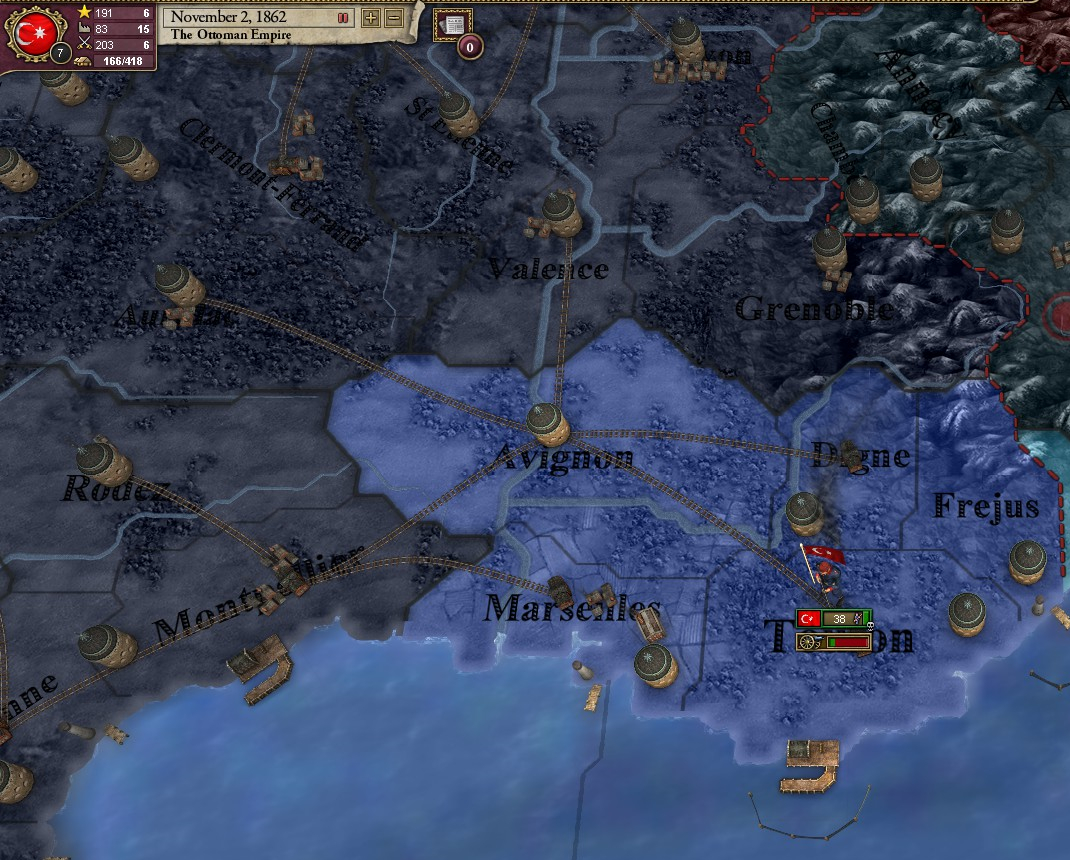
Audacious General Rifat Pasha makes an amphibious landing at Toulon (November 2nd 1862)
Whilst the French still had multiple armies in Hungary, their supply lines had been shattered by the Franco-Prussian War, and the increasingly isolated and demoralised French troops were forced to live off of the land to survive. In November 1862, coinciding with the invasion of Toulon, Ottoman forces inflicted a series of heavy defeats on French forces on the Austrian Front, with a crushing victory at the Battle of Graz sandwiched by the total surrender of the remnants of two French armies at Klagenfurt and Judenberg respectively.
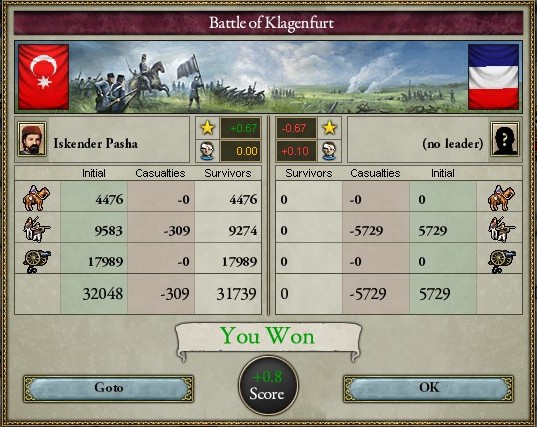
A French army surrenders at the Second Battle of Klagenfurt (November 13th 1862)
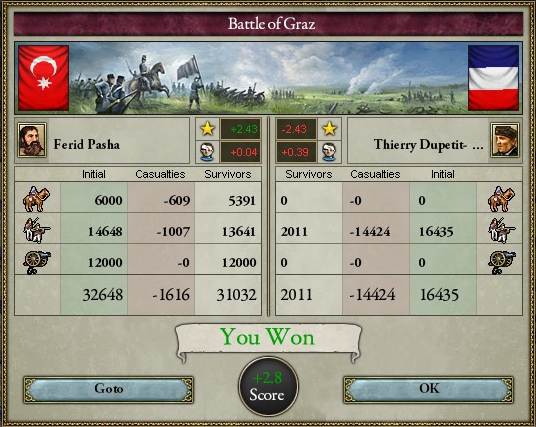
The crushing Ottoman victory at the Battle of Graz (November 17th 1862)
In December 1862, Ferid Pasha’s Army of Anatolia advanced deep into French occupied territory to begin a siege to liberate the Habsburg Capital of Vienna, with an Austro-Hungarian conscript force covering their supply lines. With most of the French forces seemingly having been eliminated, the Army of Rumelia under Iskender Pasha was meanwhile sent into Italy to begin liberating the Italian cities that the war was being fought over, and to potentially drive the Papal States out of the war as well.
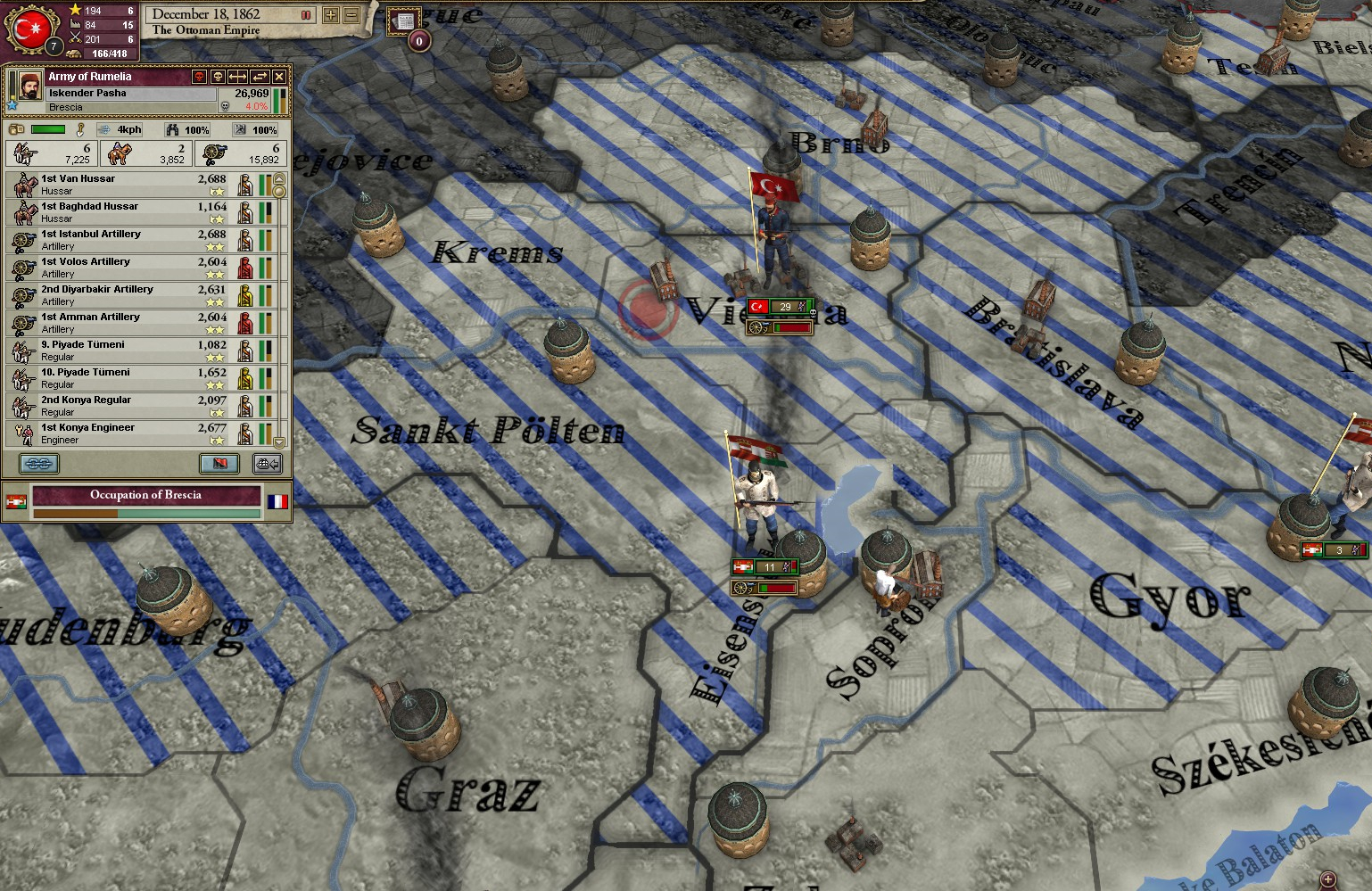
Ottoman forces begin the Third Ottoman Siege of Vienna, as liberators instead of conquerors (December 18th 1862)
This proved to be a mistake, however. In winter 1862 the North German forces swept the remaining French opposition out of the way and marched into the city of Paris. Their swift and decisive victory saw them reclaim the historical Duchy of Elsass-Lothringen, with the French eager to make a very quick peace deal. By surrendering in the Franco-Prussian War quickly, France hoped that it could regain the initiative in the Italian War of Independence and perhaps salvage some of its national honour after its mauling up north. In January 1863 a French army commanded by General Aimable Billot attacked the Ottoman forces besieging Vienna in great force, inflicting yet another defeat on the Ottomans at the site of two previous historic humiliations - even if this time we came as liberators and not as conquerors.
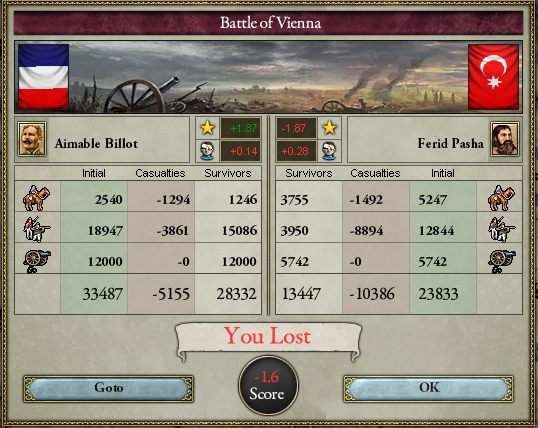
Ottoman forces are again forced to make a retreat from Vienna (January 18th 1863)
The surprise arrival of French reinforcements in Austria coincided with a huge French force marching down to the south of France, where Rifat Pasha was continuing to besiege Toulon. Despite facing nearly twice as many French troops compared to Ottoman forces under his command, Rifat Pasha inflicted a monumental defeat on the French, with the scale of our victory causing shock and surprise across all of Europe. The entirety of the French forces in their homeland were wiped out, and despite inflicting very heavy casualties on the Army of Syria in the process, Rifat Pasha’s forces were able to continue their besieging of Toulon.
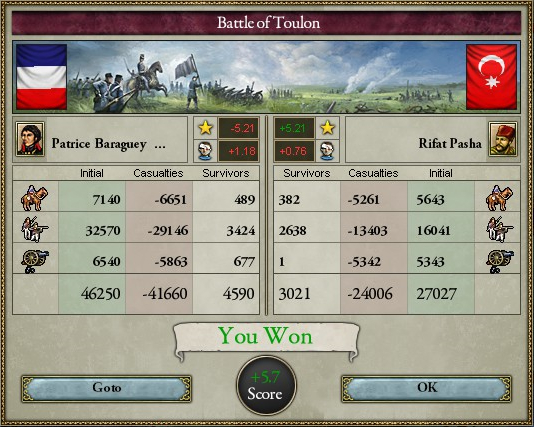
Rifat Pasha scores an immense victory at the Battle of Toulon (February 11th 1863)
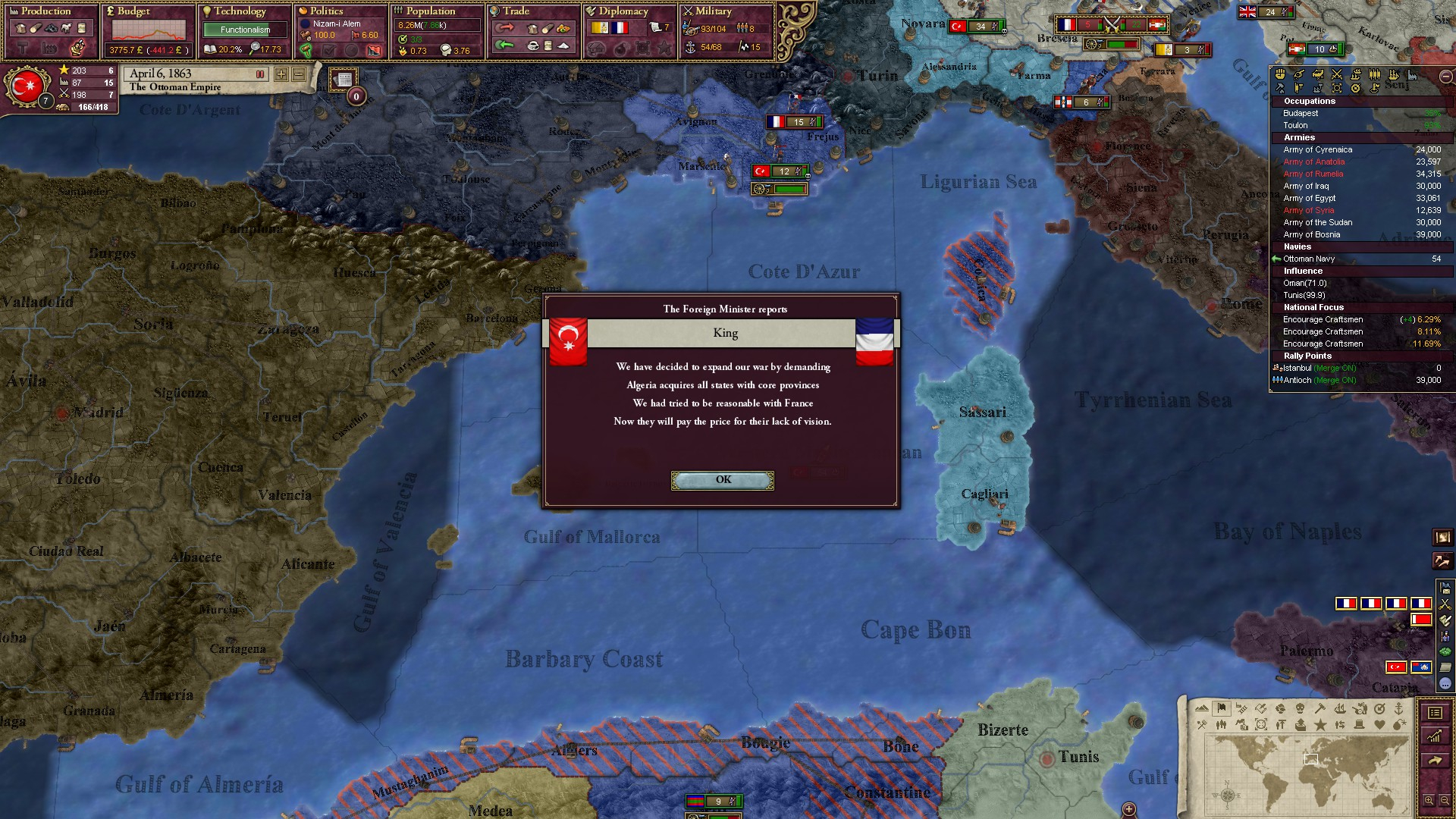
The Mediterranean Front when the Sublime Porte demanded a total French withdrawal from Algeria (April 6th 1863)
And so, in April 1863, the Grand Vizier decided to expand the war. Whilst previously we had fought a mere containing war seeking the status quo in Italy, our forces had now occupied the entirety of French Algeria, with the Army of Egypt even being ferried into France to support the Army of Syria, too. The Sublime Porte therefore demanded a permanent French withdrawal from Algeria, to signal the end of their three decade-long illegal occupation of the former Ottoman vassal state. Despite being driven back from Vienna, our forces had liberated Lombardy, and together with the remaining Habsburg forces, were attacking the remaining French-controlled cities in Venetia. It seemed to be only a matter of time before France would be forced to sue for peace.
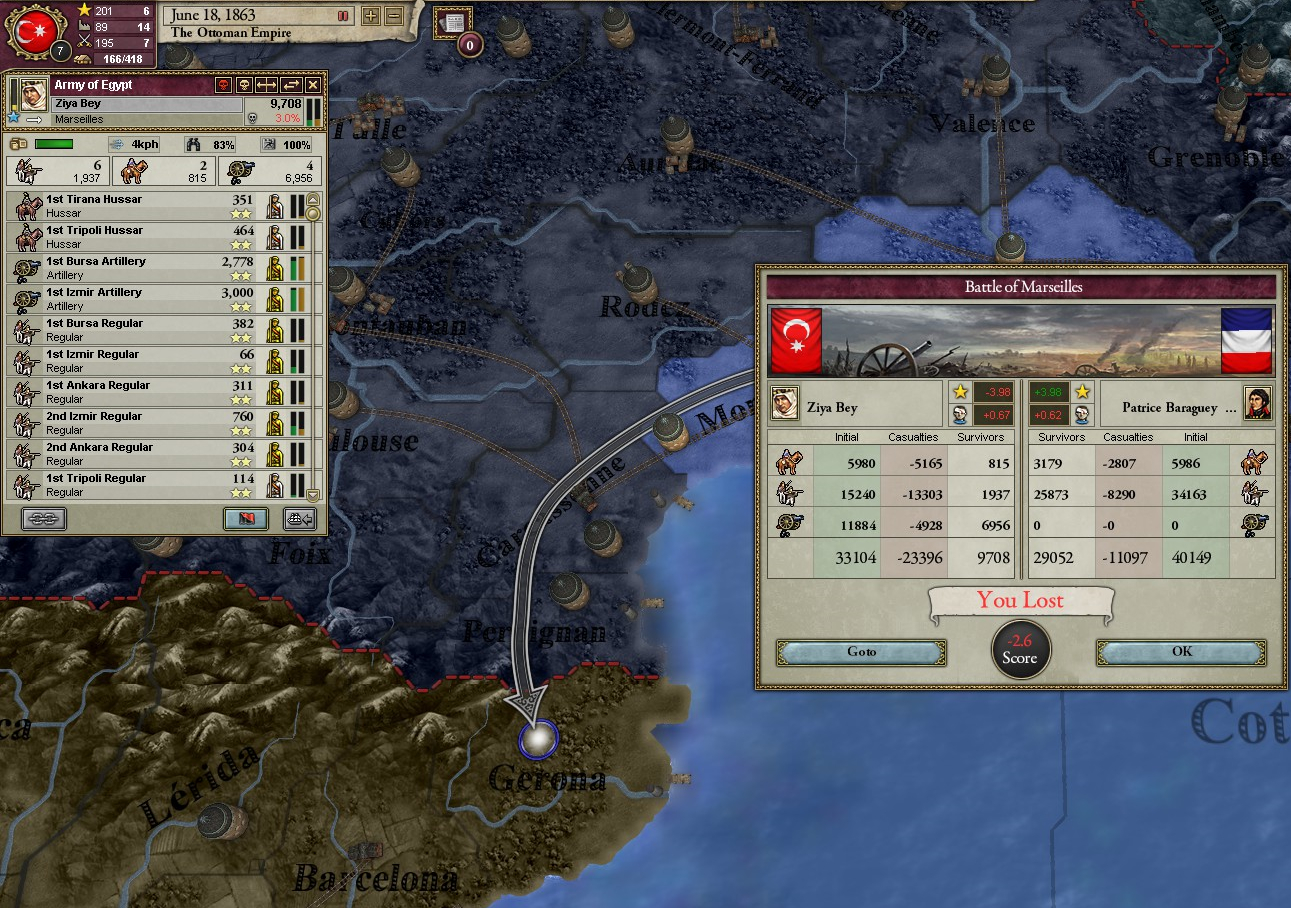
Ottoman forces retreated to friendly Spain following the defeat at Marseilles (June 18th 1863)
On June 18th, the French were however able to muster one final army and defeat the combined (but heavily reduced) forces of the Army of Syria and the Army of Egypt at the Battle of Marseilles. With naval evacuation a very risky proposal, however, the Porte utilised its recently improved relations with the Kingdom of Spain, and the continued French international isolation, to secure an agreement for our forces to retreat into Catalonia, from whence they could be withdrawn at the end of the war. Despite their furious protestations, the French were powerless to prevent us.
In July, Iskender Pasha’s Army of Rumelia also defeated the final remaining Papal Army at the Battle of Ferrara, and so despite the Army of Anatolia having spent summer recovering from its losses at Vienna, the frontline at the end of Summer 1863 continued to look promising for us. The Austro-Hungarian Italian force had begun liberating Tyrolia in an attempt to once more cut the French supply lines north of the Alps, whilst two new Habsburg forces in the East were finally retaking the occupied territory in Slovakia. Ferid Pasha’s forces in Southern Hungary were preparing for a new push on Vienna, and despite the French victory at Marseilles allowing them to send more conscripted troops into Italy, our forces now outnumbered the French in total. And the French fragility was showing.
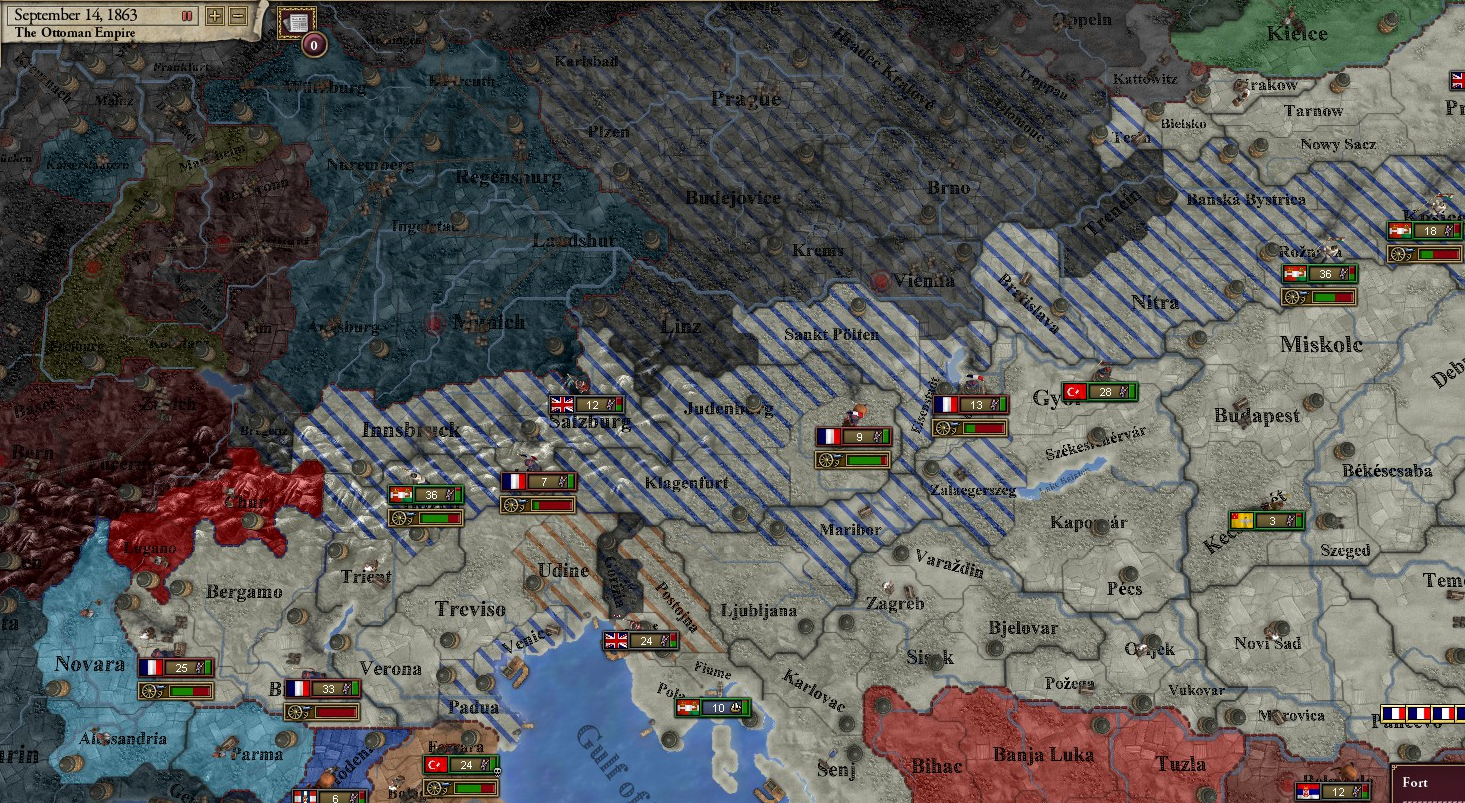
The Austrian Frontline (September 14th 1863) [1]
Ferid Pasha struck on October 8th 1863, all but destroying French General Billot’s forces at the Battle of Eisenstadt and once more throwing open the road to Vienna. This time, there were no reinforcements for France to send, and it was clear that the entirety of French occupied Bohemia, Moravia, Slovakia, and Austria would all be liberated over the winter. This proved to be the final blow for the French: Five days after Eisenstadt the French government capitulated, with its increasingly angry and despondent populace demanding an immediate end to hostilities. The French agreed to withdraw from Algeria, and the Franco-Austrian War of Italian Independence came to a victorious end for the Habsburg and Ottoman Empires.
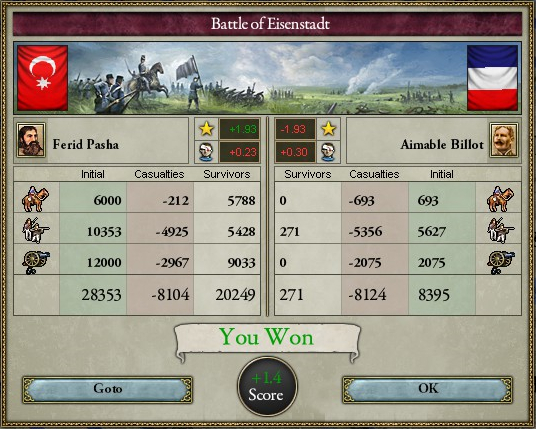
The final battle of the war ends in an Ottoman victory at Eisenstadt (October 8th 1863)
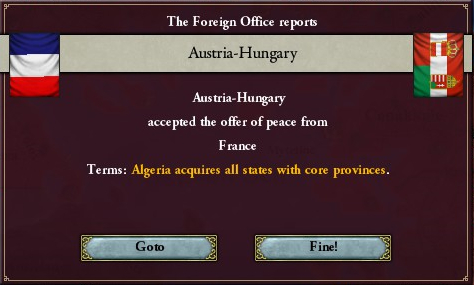
The French sign the Treaty of Brescia (October 13th 1863)
This huge war had caused huge losses of life on both sides, with almost half of the Austro-Hungarian Empire having been occupied following the implosion of their armies. Despite losing the Army of Bosnia early in the war, the Porte came out of the war with its head held extremely high internationally - the fact that the Habsburg Court had been forced to evacuate to Budapest during the war made it clear just how reliant on our support the Austro-Hungarians had been, and ensured that the full credit of the victory came to the Sublime Porte. Our forces had met, matched, and bested the forces of one of the largest empires in history, on multiple occasions, and we had come out victorious. Furthermore, by evicting the French from North Africa we had sent a message to the British that further incursions into Arabia would not be tolerated.
The same positives could not be said for the Habsburg Forces. Whilst the sheer stubbornness of Emperor Franz Josef had prevented them from surrendering in 1861, and allowed them to eventually claim a victory from the very jaws of defeat, it was still very clear that their armies were now second best not only to the French but also to the Ottomans and the Italians. The Porte were highly concerned by this turn of events, with the Pact of the Great Dynasties increasingly forming a situation where our forces and our finances were bled dry to prop up our ally.
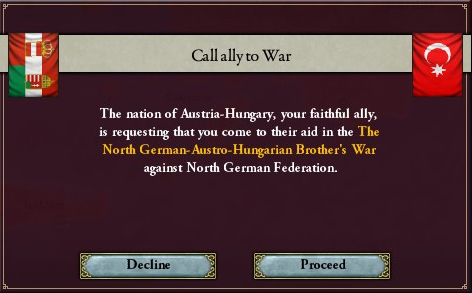
The North German Federation invades Austria-Hungary (November 11th 1863)
And so, when just one month after the end of the war, the North German Federation went to war with Austria-Hungary again, the exhausted forces of the Porte agreed that enough was enough. The call to war was rejected, and the Pact of the Great Dynasties came to an end. Despite many highs during our relationship, the Council unanimously deemed it not to be in our interests to fight yet another expensive European war far from our borders.
Moreover, relations with the Prussian Chancellor Otto von Bismarck had continued to increase in recent years; and two days later, the Porte completed this diplomatic turnaround. Following the agreement of Bismarck not to call the Empire into their “Brother’s War” with Austria-Hungary, a new alliance was signed. The Ottoman-German Alliance was born.
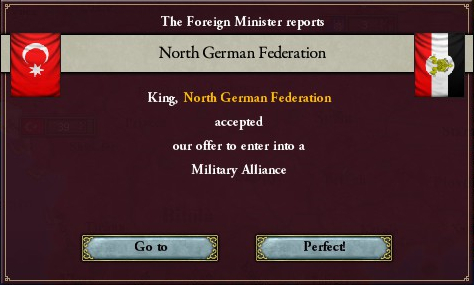
The signing of the Ottoman-German Alliance (November 13th 1863)
Notes:
[1] The British still had no part in the war, but their three armies returning from India were able to document much of what happened for the Westminster Government

Audacious General Rifat Pasha makes an amphibious landing at Toulon (November 2nd 1862)
Whilst the French still had multiple armies in Hungary, their supply lines had been shattered by the Franco-Prussian War, and the increasingly isolated and demoralised French troops were forced to live off of the land to survive. In November 1862, coinciding with the invasion of Toulon, Ottoman forces inflicted a series of heavy defeats on French forces on the Austrian Front, with a crushing victory at the Battle of Graz sandwiched by the total surrender of the remnants of two French armies at Klagenfurt and Judenberg respectively.

A French army surrenders at the Second Battle of Klagenfurt (November 13th 1862)

The crushing Ottoman victory at the Battle of Graz (November 17th 1862)
In December 1862, Ferid Pasha’s Army of Anatolia advanced deep into French occupied territory to begin a siege to liberate the Habsburg Capital of Vienna, with an Austro-Hungarian conscript force covering their supply lines. With most of the French forces seemingly having been eliminated, the Army of Rumelia under Iskender Pasha was meanwhile sent into Italy to begin liberating the Italian cities that the war was being fought over, and to potentially drive the Papal States out of the war as well.

Ottoman forces begin the Third Ottoman Siege of Vienna, as liberators instead of conquerors (December 18th 1862)
This proved to be a mistake, however. In winter 1862 the North German forces swept the remaining French opposition out of the way and marched into the city of Paris. Their swift and decisive victory saw them reclaim the historical Duchy of Elsass-Lothringen, with the French eager to make a very quick peace deal. By surrendering in the Franco-Prussian War quickly, France hoped that it could regain the initiative in the Italian War of Independence and perhaps salvage some of its national honour after its mauling up north. In January 1863 a French army commanded by General Aimable Billot attacked the Ottoman forces besieging Vienna in great force, inflicting yet another defeat on the Ottomans at the site of two previous historic humiliations - even if this time we came as liberators and not as conquerors.

Ottoman forces are again forced to make a retreat from Vienna (January 18th 1863)
The surprise arrival of French reinforcements in Austria coincided with a huge French force marching down to the south of France, where Rifat Pasha was continuing to besiege Toulon. Despite facing nearly twice as many French troops compared to Ottoman forces under his command, Rifat Pasha inflicted a monumental defeat on the French, with the scale of our victory causing shock and surprise across all of Europe. The entirety of the French forces in their homeland were wiped out, and despite inflicting very heavy casualties on the Army of Syria in the process, Rifat Pasha’s forces were able to continue their besieging of Toulon.

Rifat Pasha scores an immense victory at the Battle of Toulon (February 11th 1863)

The Mediterranean Front when the Sublime Porte demanded a total French withdrawal from Algeria (April 6th 1863)
And so, in April 1863, the Grand Vizier decided to expand the war. Whilst previously we had fought a mere containing war seeking the status quo in Italy, our forces had now occupied the entirety of French Algeria, with the Army of Egypt even being ferried into France to support the Army of Syria, too. The Sublime Porte therefore demanded a permanent French withdrawal from Algeria, to signal the end of their three decade-long illegal occupation of the former Ottoman vassal state. Despite being driven back from Vienna, our forces had liberated Lombardy, and together with the remaining Habsburg forces, were attacking the remaining French-controlled cities in Venetia. It seemed to be only a matter of time before France would be forced to sue for peace.

Ottoman forces retreated to friendly Spain following the defeat at Marseilles (June 18th 1863)
On June 18th, the French were however able to muster one final army and defeat the combined (but heavily reduced) forces of the Army of Syria and the Army of Egypt at the Battle of Marseilles. With naval evacuation a very risky proposal, however, the Porte utilised its recently improved relations with the Kingdom of Spain, and the continued French international isolation, to secure an agreement for our forces to retreat into Catalonia, from whence they could be withdrawn at the end of the war. Despite their furious protestations, the French were powerless to prevent us.
In July, Iskender Pasha’s Army of Rumelia also defeated the final remaining Papal Army at the Battle of Ferrara, and so despite the Army of Anatolia having spent summer recovering from its losses at Vienna, the frontline at the end of Summer 1863 continued to look promising for us. The Austro-Hungarian Italian force had begun liberating Tyrolia in an attempt to once more cut the French supply lines north of the Alps, whilst two new Habsburg forces in the East were finally retaking the occupied territory in Slovakia. Ferid Pasha’s forces in Southern Hungary were preparing for a new push on Vienna, and despite the French victory at Marseilles allowing them to send more conscripted troops into Italy, our forces now outnumbered the French in total. And the French fragility was showing.

The Austrian Frontline (September 14th 1863) [1]
Ferid Pasha struck on October 8th 1863, all but destroying French General Billot’s forces at the Battle of Eisenstadt and once more throwing open the road to Vienna. This time, there were no reinforcements for France to send, and it was clear that the entirety of French occupied Bohemia, Moravia, Slovakia, and Austria would all be liberated over the winter. This proved to be the final blow for the French: Five days after Eisenstadt the French government capitulated, with its increasingly angry and despondent populace demanding an immediate end to hostilities. The French agreed to withdraw from Algeria, and the Franco-Austrian War of Italian Independence came to a victorious end for the Habsburg and Ottoman Empires.

The final battle of the war ends in an Ottoman victory at Eisenstadt (October 8th 1863)

The French sign the Treaty of Brescia (October 13th 1863)
This huge war had caused huge losses of life on both sides, with almost half of the Austro-Hungarian Empire having been occupied following the implosion of their armies. Despite losing the Army of Bosnia early in the war, the Porte came out of the war with its head held extremely high internationally - the fact that the Habsburg Court had been forced to evacuate to Budapest during the war made it clear just how reliant on our support the Austro-Hungarians had been, and ensured that the full credit of the victory came to the Sublime Porte. Our forces had met, matched, and bested the forces of one of the largest empires in history, on multiple occasions, and we had come out victorious. Furthermore, by evicting the French from North Africa we had sent a message to the British that further incursions into Arabia would not be tolerated.
The same positives could not be said for the Habsburg Forces. Whilst the sheer stubbornness of Emperor Franz Josef had prevented them from surrendering in 1861, and allowed them to eventually claim a victory from the very jaws of defeat, it was still very clear that their armies were now second best not only to the French but also to the Ottomans and the Italians. The Porte were highly concerned by this turn of events, with the Pact of the Great Dynasties increasingly forming a situation where our forces and our finances were bled dry to prop up our ally.

The North German Federation invades Austria-Hungary (November 11th 1863)
And so, when just one month after the end of the war, the North German Federation went to war with Austria-Hungary again, the exhausted forces of the Porte agreed that enough was enough. The call to war was rejected, and the Pact of the Great Dynasties came to an end. Despite many highs during our relationship, the Council unanimously deemed it not to be in our interests to fight yet another expensive European war far from our borders.
Moreover, relations with the Prussian Chancellor Otto von Bismarck had continued to increase in recent years; and two days later, the Porte completed this diplomatic turnaround. Following the agreement of Bismarck not to call the Empire into their “Brother’s War” with Austria-Hungary, a new alliance was signed. The Ottoman-German Alliance was born.

The signing of the Ottoman-German Alliance (November 13th 1863)
Notes:
[1] The British still had no part in the war, but their three armies returning from India were able to document much of what happened for the Westminster Government
- 1
I had decided after the Austrian implosion to drop them as an ally at the end of the war come-what-may, yeah. The opportunity to ally with the (previously unaligned) Prussians/North Germans was just too good to miss, and with the Habsburg troubles I wasn't sure how much help they'd even be able to offer in the worst case scenario of a war with Russia.I was about to suggest dropping Austria as our main ally, but things are seemingly going to turn around. Even if they're a lesser ally, it's good to keep good on promises. Let's see if we can snatch a few provinces from this war
While I considered taking the Algerian provinces directly, the French had already upgraded two of them to full States, which meant that they would cost far too much infamy and warscore. Liberating Algeria was far cheaper, and still opens up more possibilities in future
Threadmarks
View all 63 threadmarks
Reader mode
Reader mode

